Body armor sales have soared since 2020.
Of course, while you’re stocking up on whatever it is these days, you might be interested in a little protection as well.
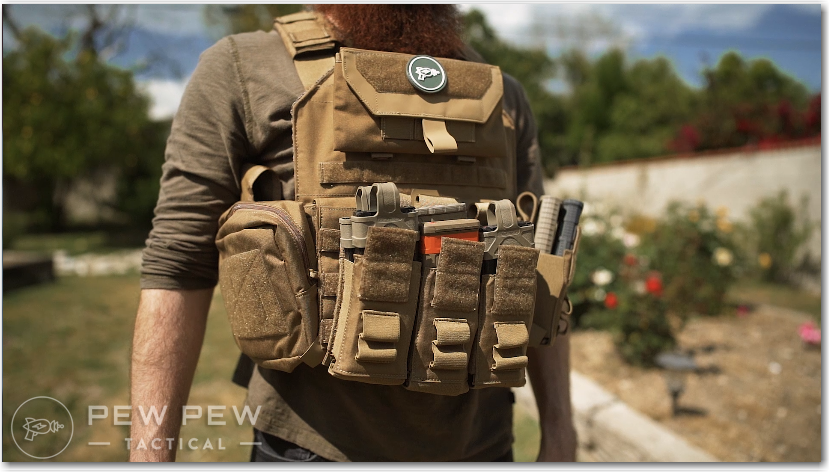
With guns and ammo nowhere to be found, it makes sense that consumers would gravitate towards other means of passive protection.
Enter body armor.
The body armor arena is chock-full of plates claiming to prevent bullet penetration, in turn, keeping wearers safe from riotous mobs.
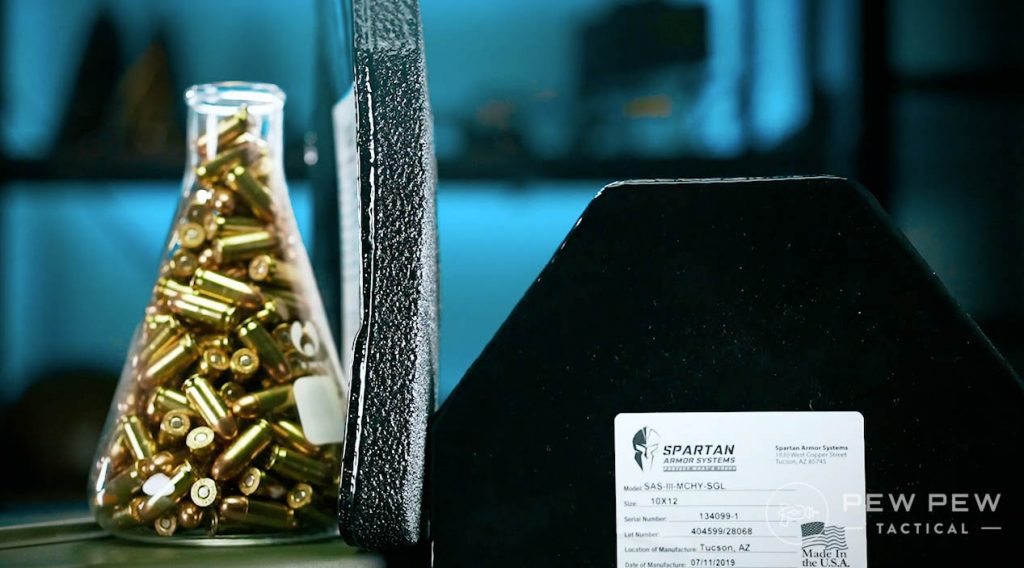
But do these claims really pan out in reality? Or is it some marketing hype?
Lucky for you, the nerds here at Pew Pew Tactical devoted a whole day in the desert, torture testing a handful of body armor set-ups…this time of the Ceramic and UHMWPE (ultra-high molecular weight polyethylene.
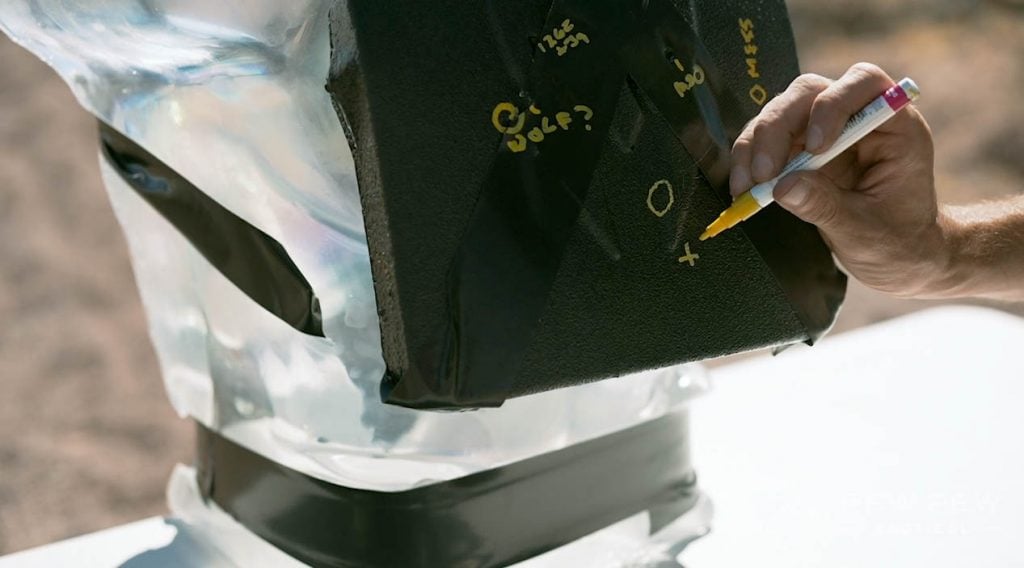
Previously we looked at AR500 (super strong steel) variants with our fav going to AR500 Armor (full review).
So, if you’ve ever wondered whether that body armor you have stacked against your ammo, guns, and MREs is worth its weight in salt…read on!
(Oh, and bonus, RMS and Mira Safety offer special discount codes to PPT readers, so be sure to keep an eye out for those!)
THE QUICK LIST
-
Light & Low Profile Level III
-
Budget Level III Option
-
Low Ceramic Frag
-
Handled all 5.56 Flavors
-
Stopped 30.06 Black Tip
-
Editor’s Pick Level IV Armor
Table of Contents
Loading…
Body Armor Basics: Level III vs. Level IV
Before we dive into shooting things, let’s cover some basics to give you a good understanding of body armor.
The National Institute of Justice, or NIJ, serves as the U.S. government’s regulatory apparatus responsible for testing and assigning threat performance levels to body armor.
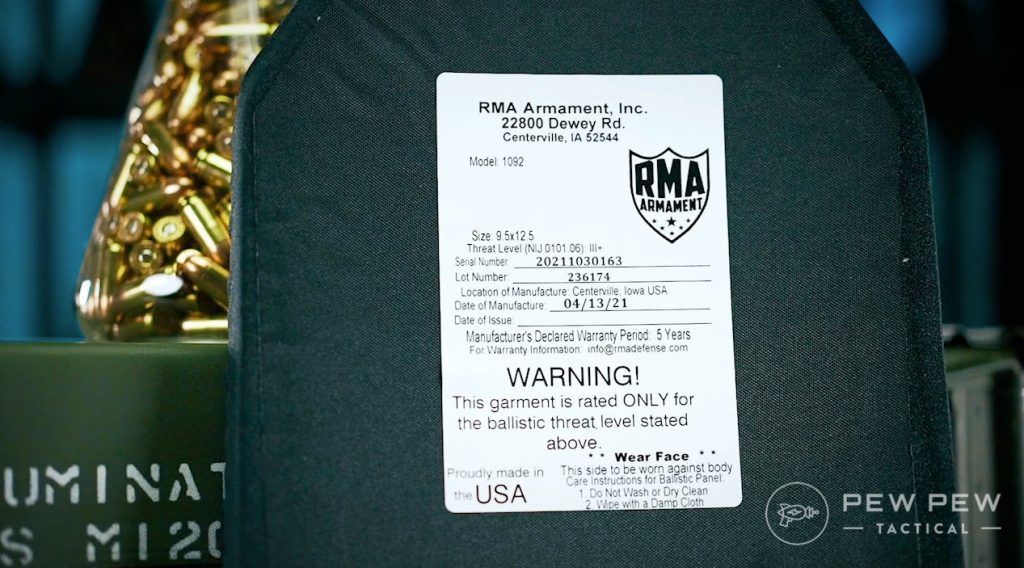
They primarily do this for the benefit of law enforcement.
However, commercial submissions are accepted for testing should a manufacturer want to advertise products as “NIJ certified” on the civilian market.
Level III Body Armor
On paper, Level III plates occupy the first level of armor, offering protection against rifle rounds.
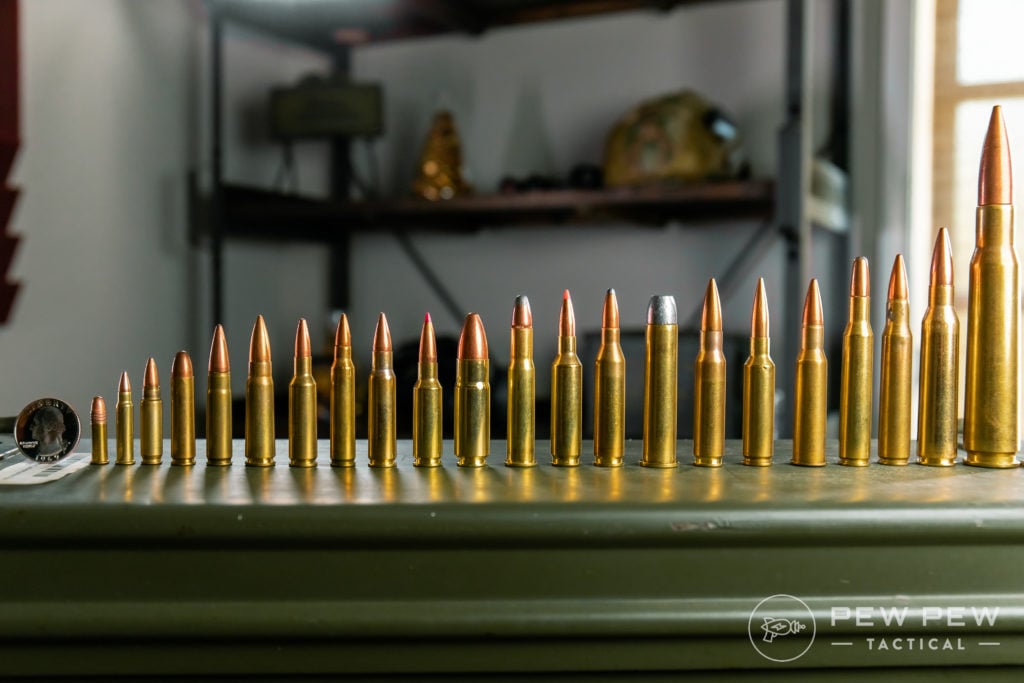
Specifically, Level III should take a total of six hits of spaced out 7.62x51mm NATO M80 ball rounds traveling at 2,700 feet-per-second.
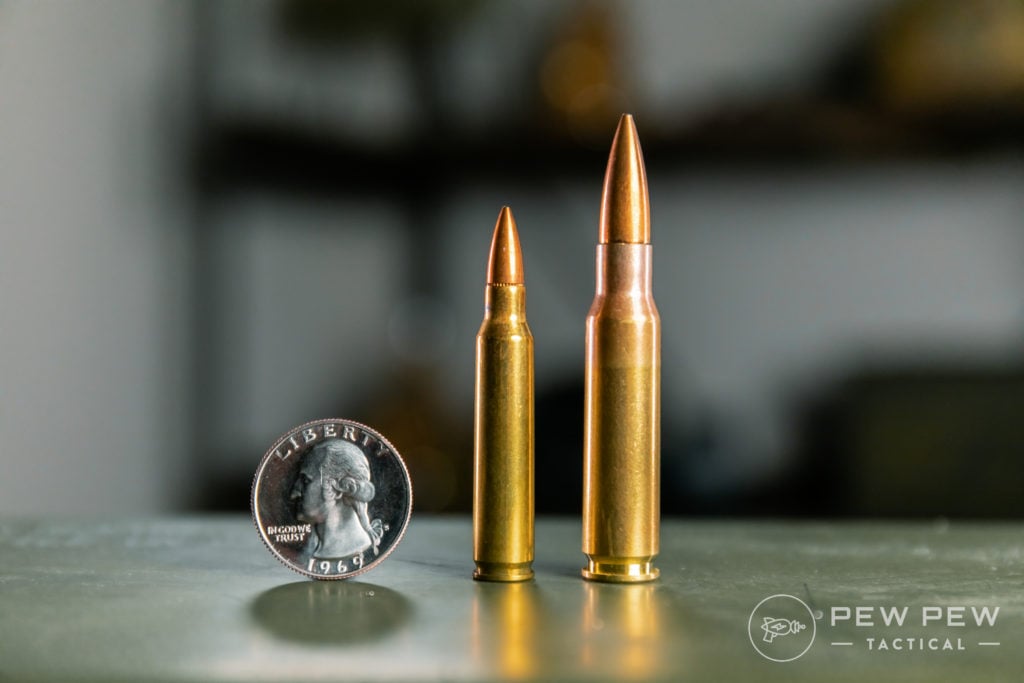
(Not much different than your standard Winchester .308 hunting cartridges.)
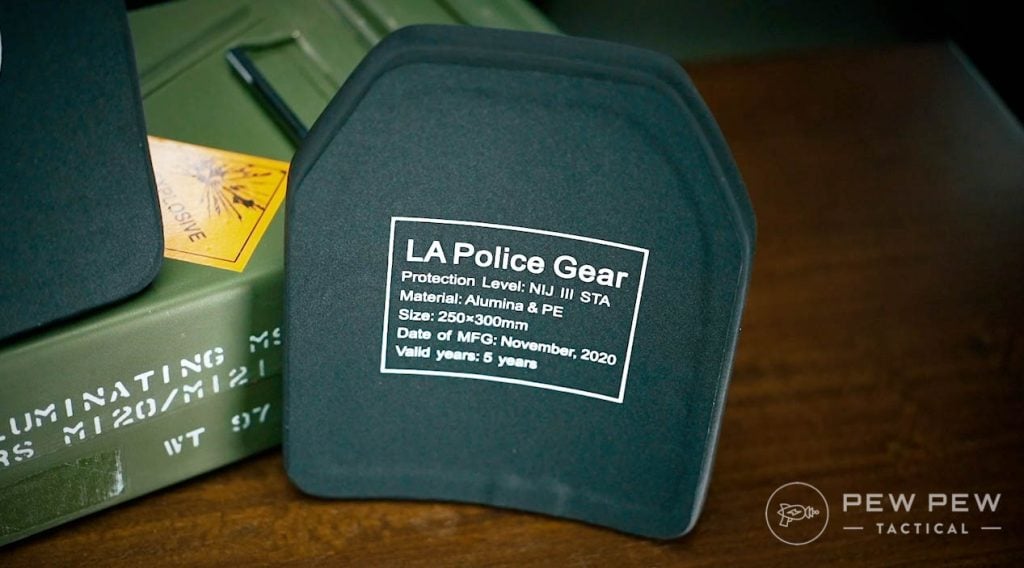
However, this is where things get a bit tricky.
While Level III plates do usually stop various lead-core 5.56 NATO cartridges, depending on the construction material, they may fail against cartridges with mild armor piercing properties.
Pure poly-ethylene plates, for example, will most likely fail against M855 “Green Tip” 5.56, while M193 may succeed in penetrating steel armor, etc.
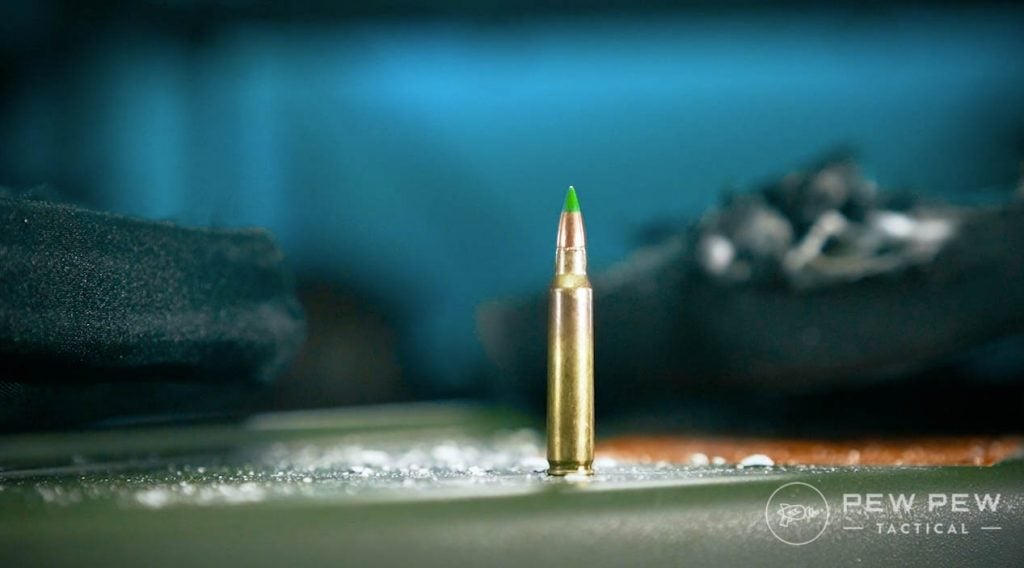
Complicating things further, some armor manufacturers mark their plates as “3+” — a threat rating not actually recognized by the NIJ.
It’s meant to indicate a sort of “in-between” zone where a Level III plate can take some 5.56 AP hits.
But it doesn’t meet the significantly higher threat rating that would constitute a Level IV plate.
Level IV Body Armor
Level IV plates currently reside as the highest-rated threat level of armor recognized by the NIJ.
In theory, it should stop Level III’s six hits of spaced M80 ball, all 5.56 threats including M855 and 193.
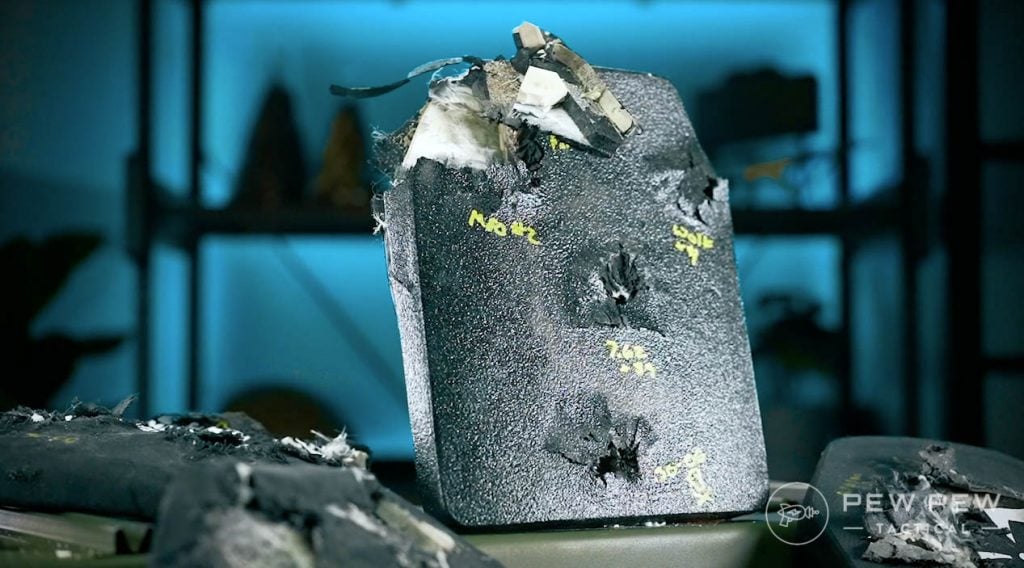
Additionally, it should take at least one round of armor-piercing .30-06 Black Tip without fail.
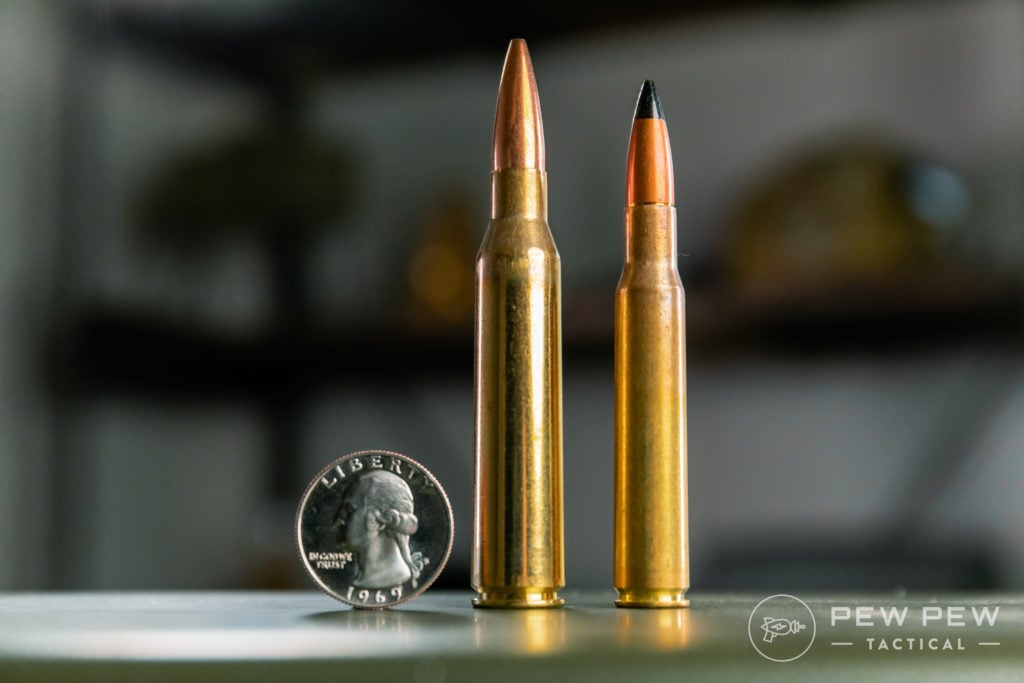
Test Parameters: Level III
While we tested a big batch of steel armor a few years prior, we’ve never had the opportunity to test more modern composite body armors…until recently.
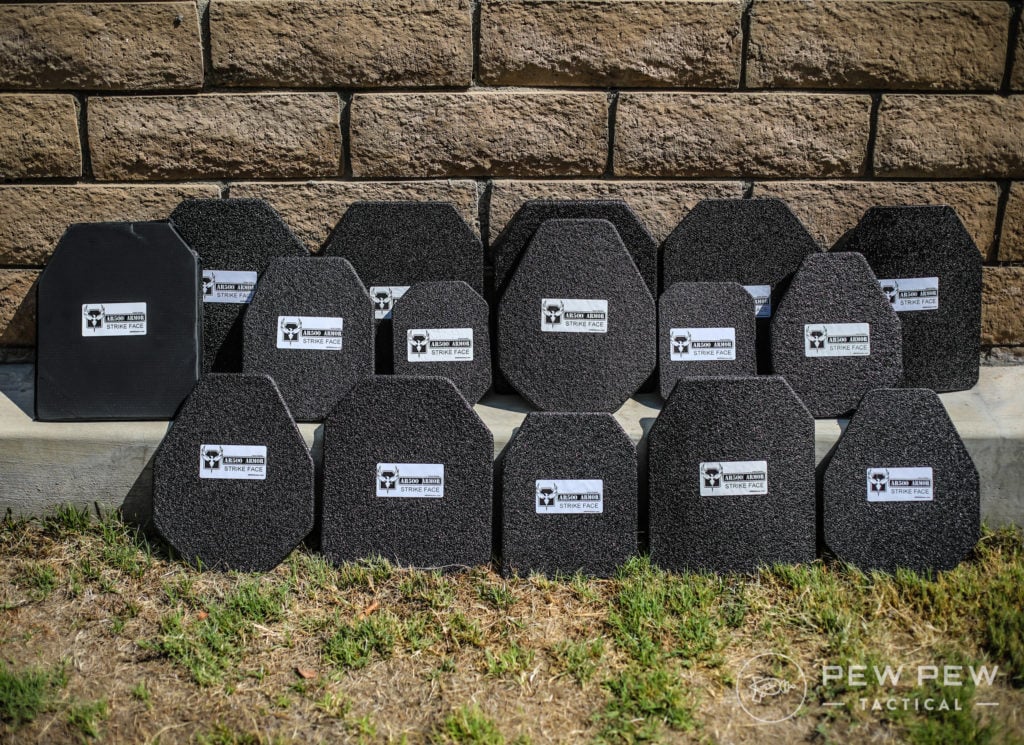
Just to be clear, we are not official scientists here.
This test is inherently not scientific in nature. We’re just dorks shooting in the desert and not in the presumably rigid and controlled sterile lab environments available to…bullet scientists.
Also, we came in with a slight bias – we wanted these plates to fail.
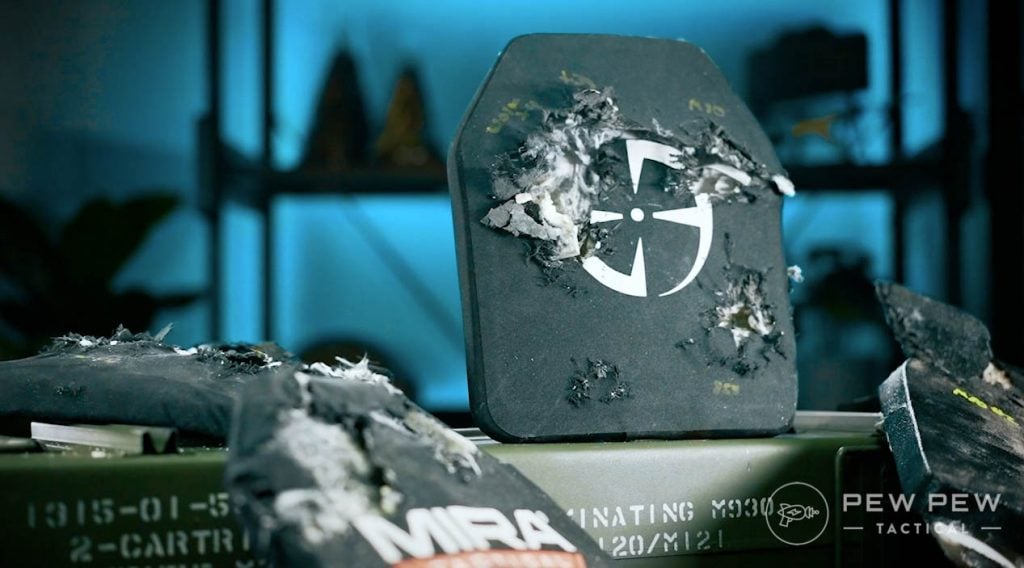
In our opinion, it’s way more interesting to see what makes body armor fail spectacularly than a rigid science experiment in a lab.
So, that said, what were the parameters?
We devised a six-shot string on each plate variant to see the exact type of damage each individual round would cause to the plate.
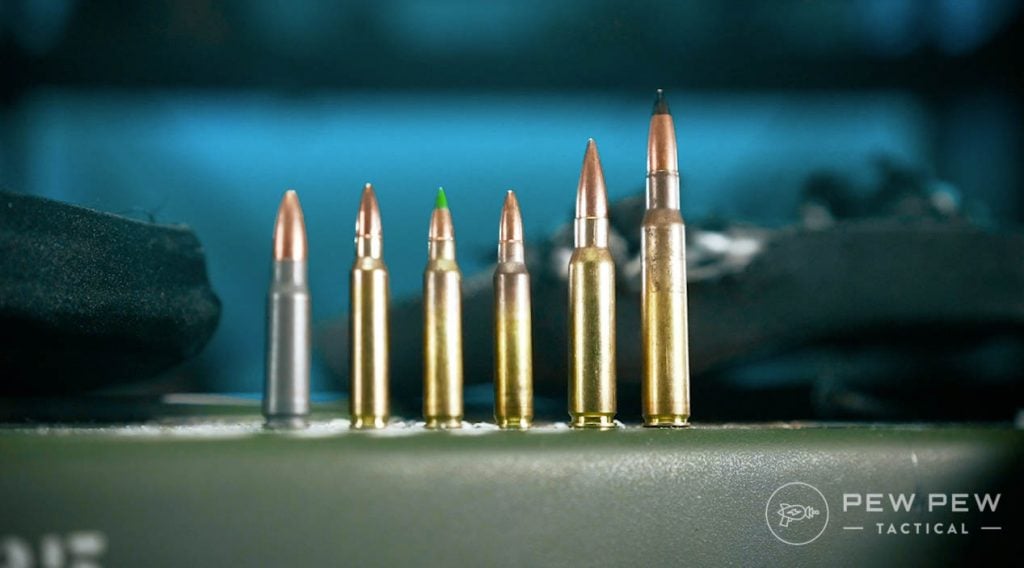
We used:
- Tula 7.62×39 HP, 122-grain
- PPU M80 ball
- Wolf Copper Jacketed .223 Rem, 55-grain
- American Eagle XM193, 55-grain
- M855 Green Tip
- .30-06 Armor Piercing Black Tip (Assuming the plate managed to survive that far.)
The NIJ testing standard is done from about 15 meters or 50 feet-ish, so we measured that same distance and set up shop.
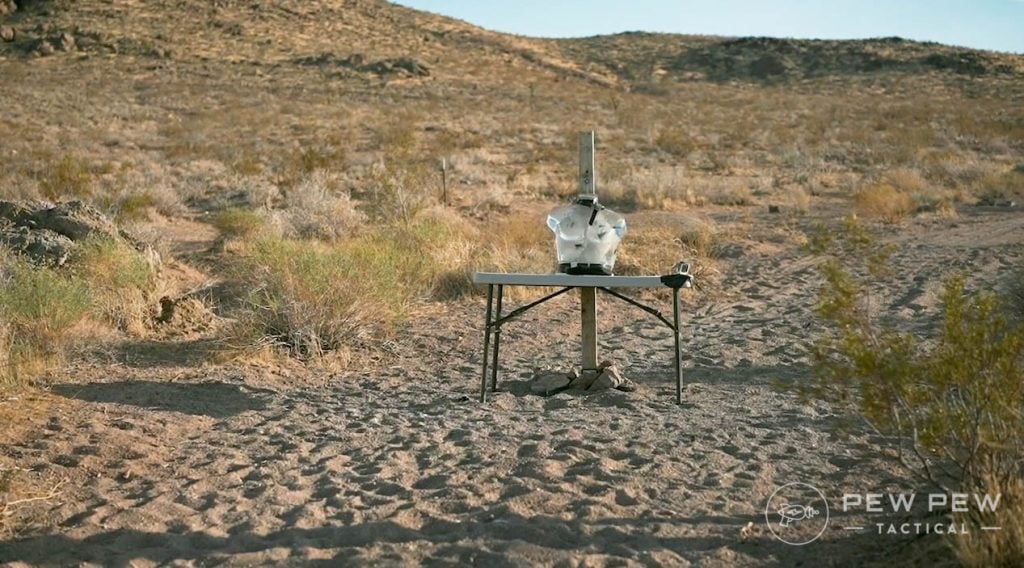
We precariously secured each plate to our creepy, disembodied ballistic gelatin torso provided by Clear Ballistics.
This set-up, we hoped, would give us a better idea of how nasty gunshot wounds look if your PPE fails.
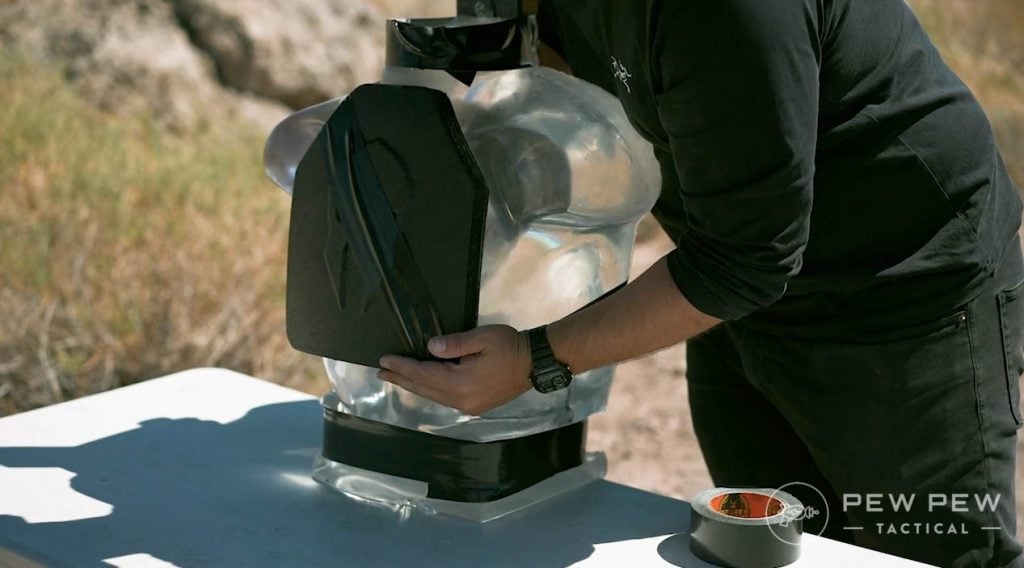
Level III Ceramic & UHMWPE Armor Testing
We took to the range with the following Level III plates:
- Spartan Armor UHMWPE “Elaphros”
- LA Police Gear Level III Plate
- RMA Armament Level 3+ Plate
- AR500 UHMWPE
Spartan Armor UHMWPE “Elaphros”
Weighing in at just 3.5-pounds with a thickness of about 1.5-inches, the Elaphros uses an ultra-high molecular weight polyethylene in an anti-spall coating of sorts.
This makes it one of the lighter and lower-profile plates we murdered.
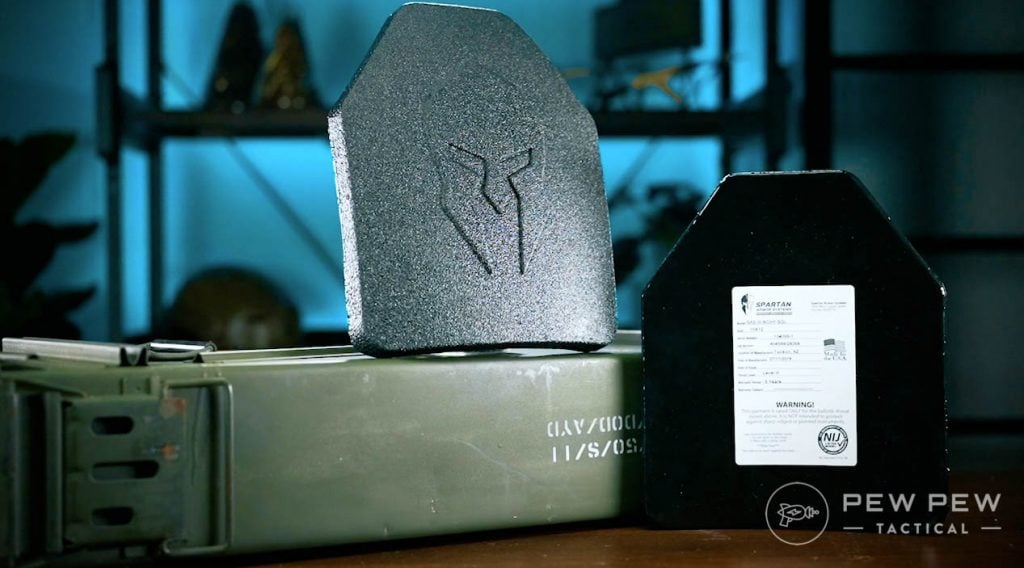
First up, Tula 7.62×39, and it’s about what you’d expect – a pretty minimal entry hole with a bit of backface deformation that split the corner of the plate’s coating. Basically, it showed off all of the compressed polyethylene layers.
A follow-up shot with an M80 ball a few inches away produced pretty similar results. The rear face deformation we saw would probably have your body in pretty banged up shape from blunt trauma alone. But you’re gonna be alright, champ.
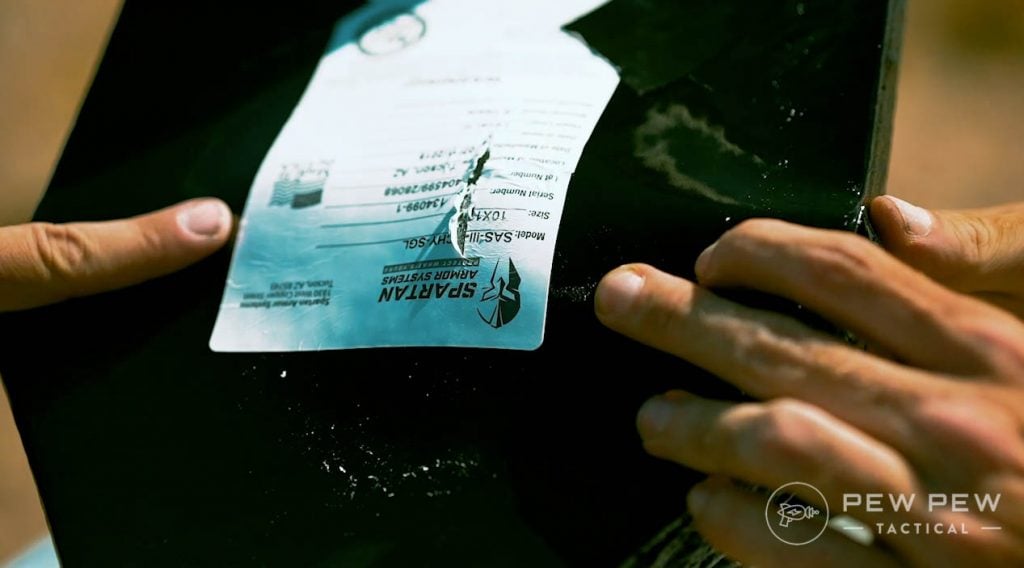
The damage from Wolf .223 was so negligible that we actually had a hard time finding the impact. Its effect on the rear of the plate was practically zero.
We managed to induce a tiny bit more rear face deformation with the zippier XM193. Though Level III on its own isn’t technically rated for XM193, the Elaphros ate it just fine.
The Elaphros survived relatively intact until….
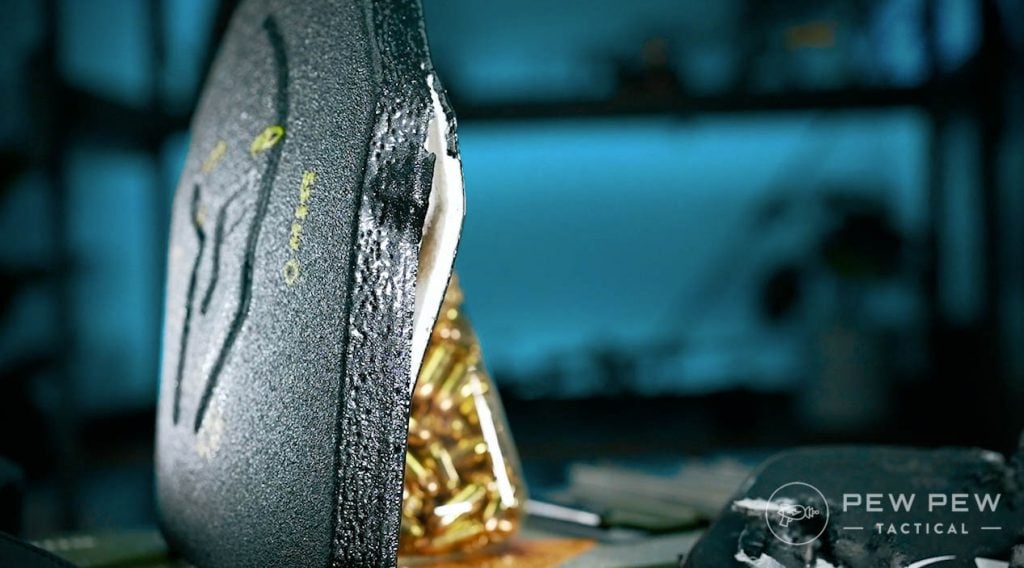
Green Tip. You dead, son.
The steel-core nature of the M855 Green Tip round sailed through the polyethylene with no issue, striking the plate slightly low and right of center.
It did some ballistic cartwheels through the material and exited the backside of the plate about an inch higher before piercing our poor gel mans’ left pec.
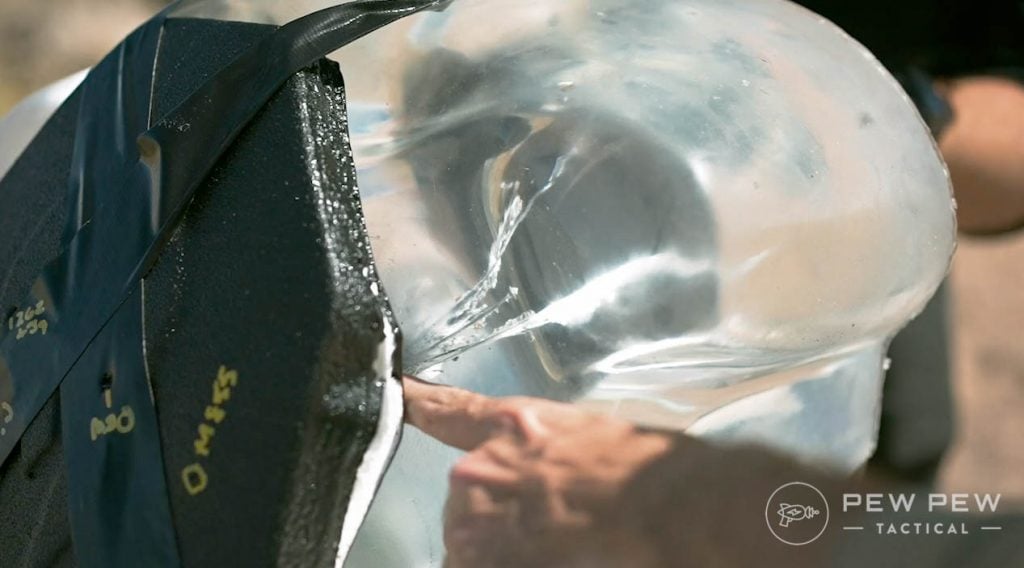
Ultimately, it delivered a messy confetti burst of shrapnel to what would be the left lung.
Game over.
Since the Green Tip did the trick, we saw no need to hit gel man with the Black Tip. He had a busier day ahead.
Prices accurate at time of writing
Prices accurate at time of writing
-
25% off all OAKLEY products - OAKLEY25
Copied! Visit Merchant
LA Police Gear Level III
Weighing in at about 5-pounds and coming in at about 1-inch of total thickness, the LAPG Level III plate definitely occupies the budget side cost-wise…somewhat concerningly, I might add.
The LAPG plate is also a bit different construction-wise. This one’s got a ceramic strike face with aluminum oxide or alumina backer.
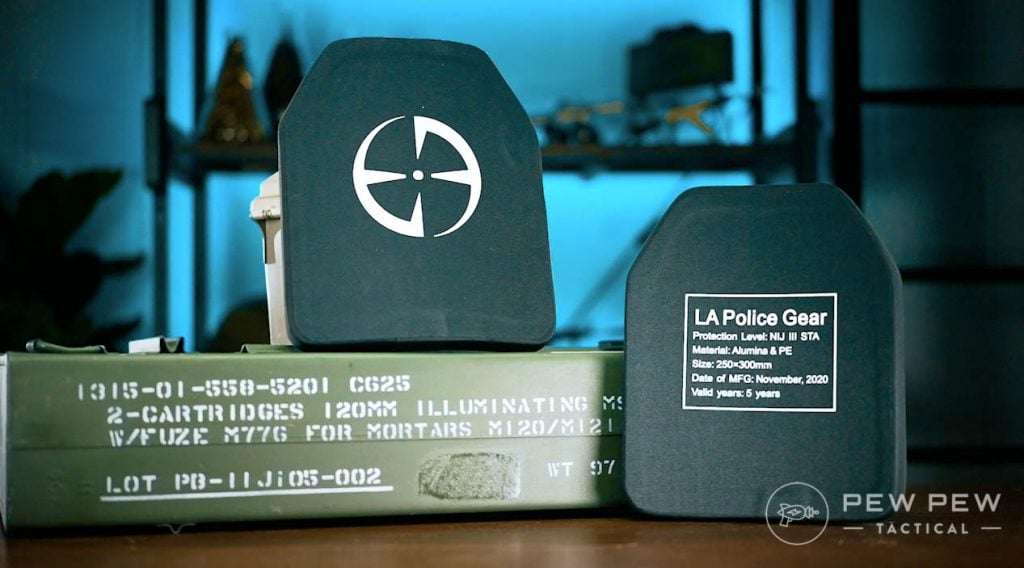
At the range, our first big notable difference materials-wise quickly came into play.
The LAPG plate ate the Tula 7.62 just fine with minimal backface deformation. BUT that cavity in the front spewed a lot of ceramic material outwards in the process.
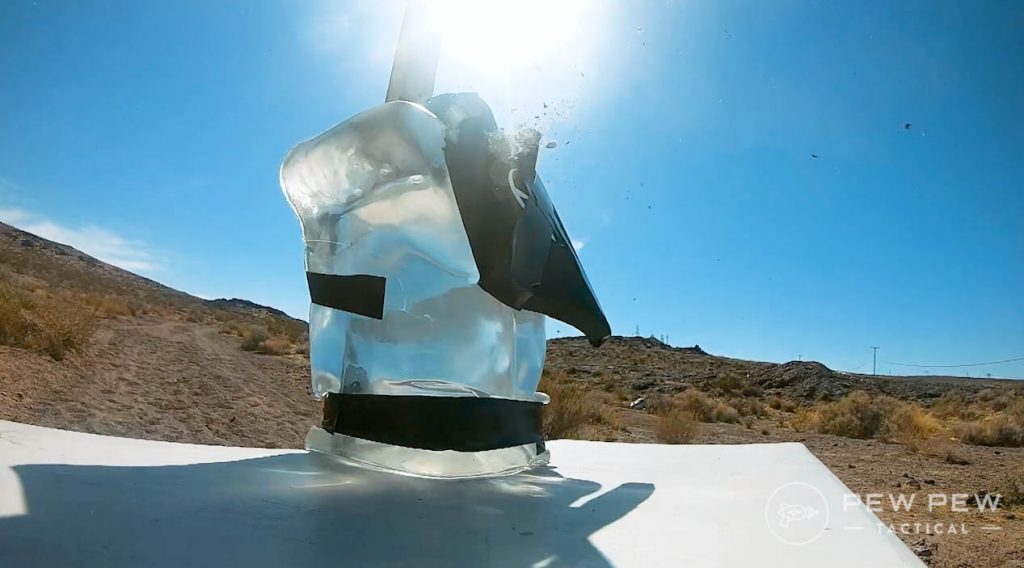
The plate handled M80 just fine with even less back bulge than the Elaphros, if only slightly.
It also stopped Wolf .223, but the hit landed just below the Tula 7.62×39 shot.
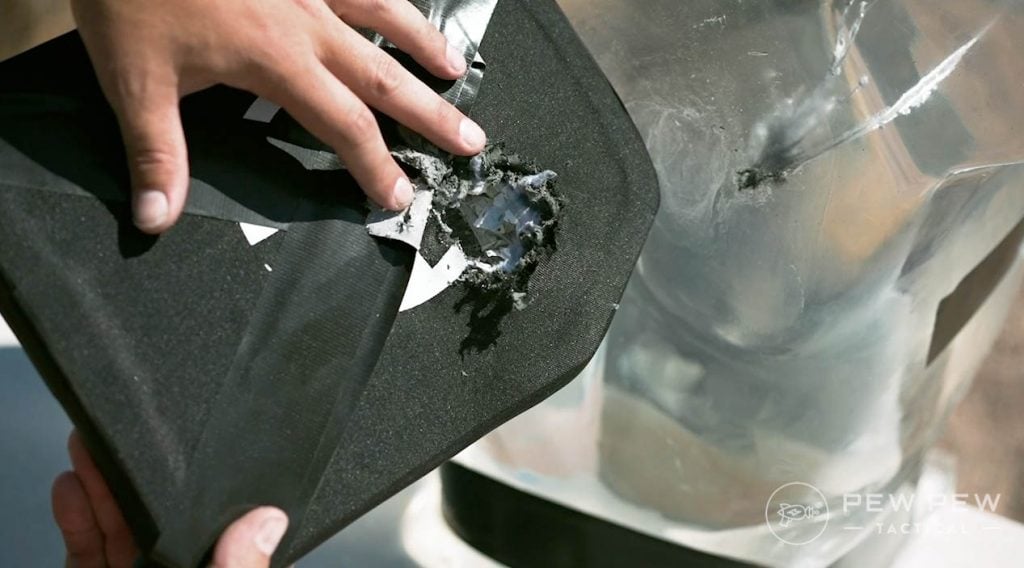
It wound up linking the two blown-out areas to create what’s now a compromised strike face about 4-inches tall.
The XM193 stopped in the upper right portion of the plate. That said, the blow took a good chunk of the plate’s top foam edge with it.
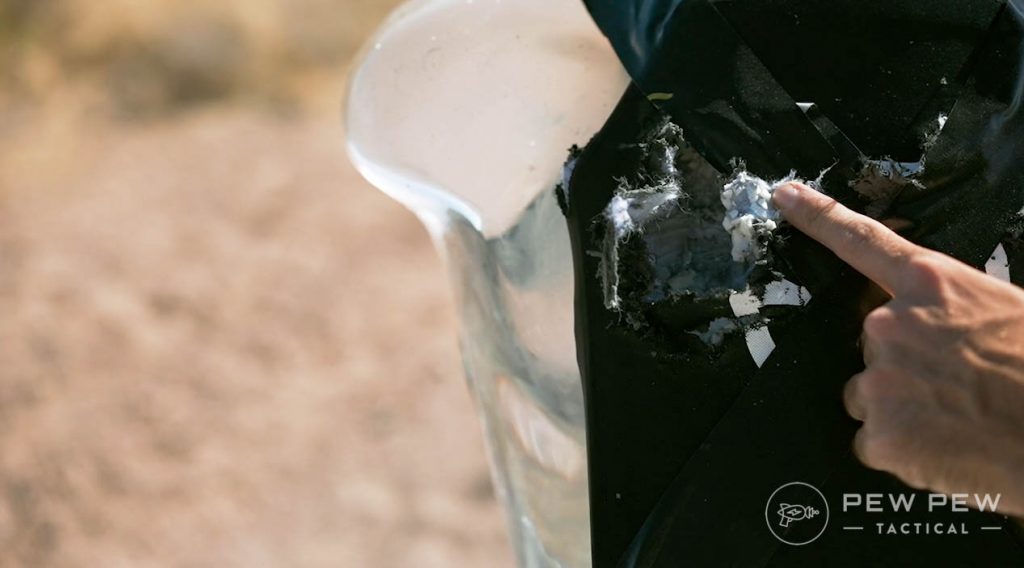
M855 hit a bit low of center and was similarly stopped in its tracks. Neither round did much to the rear surface of the plate at all, earning the LAPG plate a warrior’s death via .30-06 Black Tip.
That Black Tip round hit just a bit low and left of our previous shot and punched clean through.
It left a golf ball-sized deformation on the rear, dragging a whole lot of nasty materials into the wound channel.
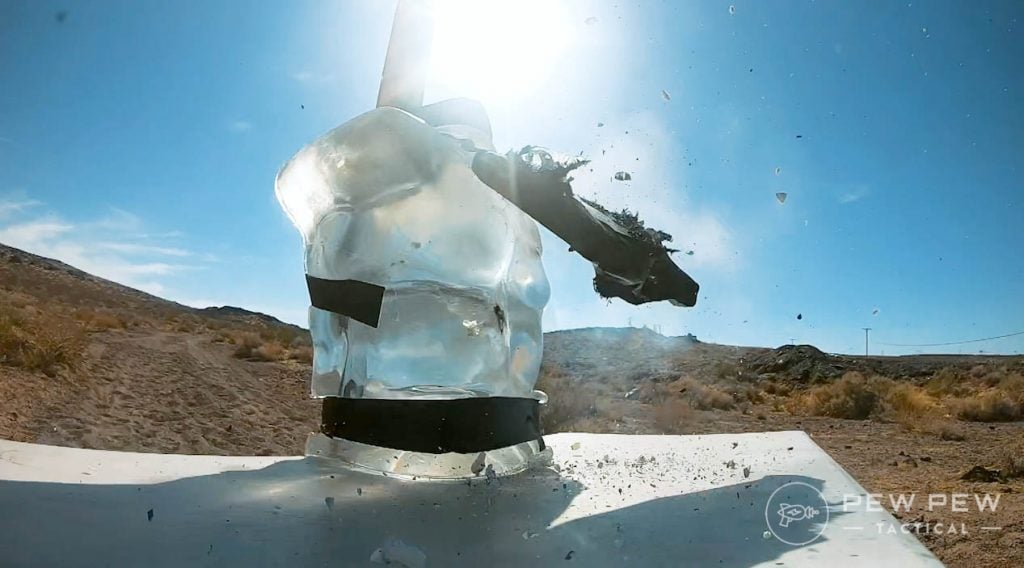
Needless to say, you’re probably in a supremely bad situation if someone shoots at you inside of 50-feet with .30-06 to begin with. The damage a single Black Tip does to our punished gelatin man is pretty damn nasty.
Worth noting, LAPG uses the somewhat clinical term “NIJ Level III tested” on their product page. On the other hand, Spartan and others explicitly say “NIJ certified” with an accompanying NIJ logo or seal of approval.
What does that mean?
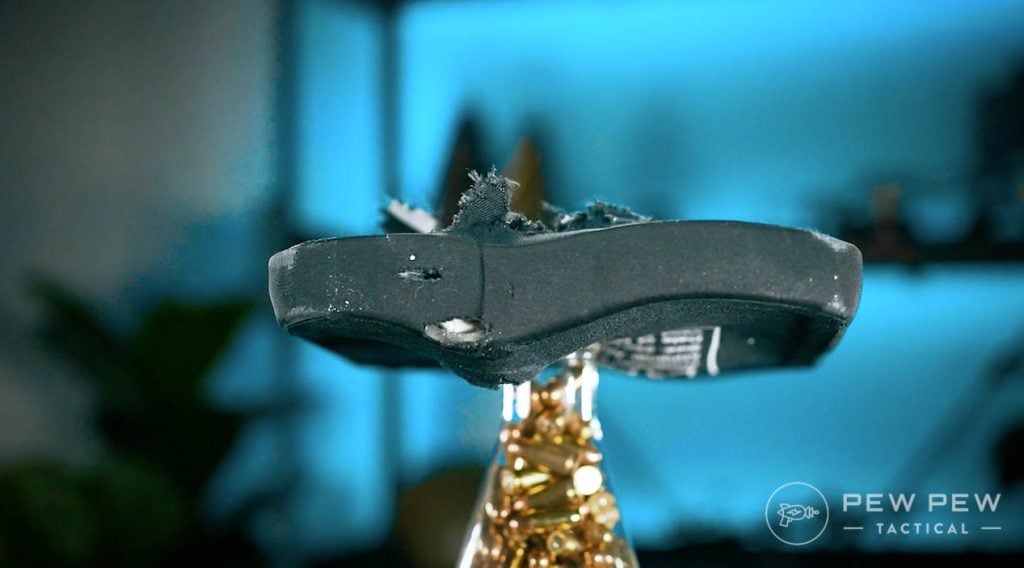
LAPG likely conducted its own independent testing and found that their product does indeed meet or exceed NIJ certification.
Whether that’s accurate or even matters, I’ll leave that for you to decide.
Prices accurate at time of writing
Prices accurate at time of writing
-
25% off all OAKLEY products - OAKLEY25
Copied! Visit Merchant
RMA Armament Level 3+ Plate
Comprised of a ceramic strike face with a polyethylene backer, the RMA Armament Level 3+ Plate weighs in at about 4.5-pounds. And it offers a little over 1.2-inches in thickness.
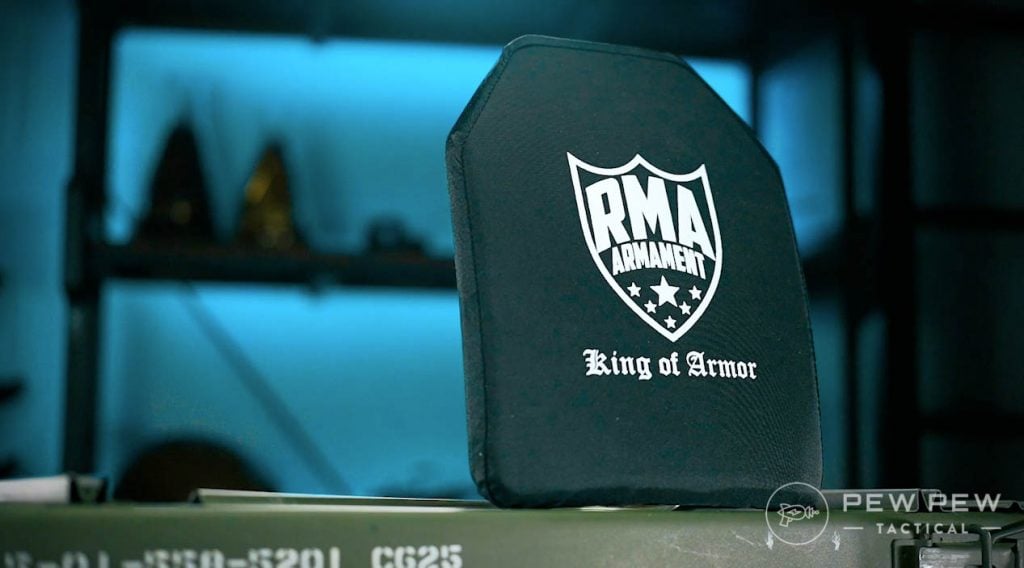
The self-proclaimed KING OF ARMOR’s 3+ plate swallowed that Tula 7.62 with no issues and minimal rear blunt force ouches.
But the NATO M80 ball landed a pretty nasty hit on the upper right portion of the plate. While stopped, it would likely result in a pretty painful blow to one’s collar bone.
But you know, that beats being dead…probably.
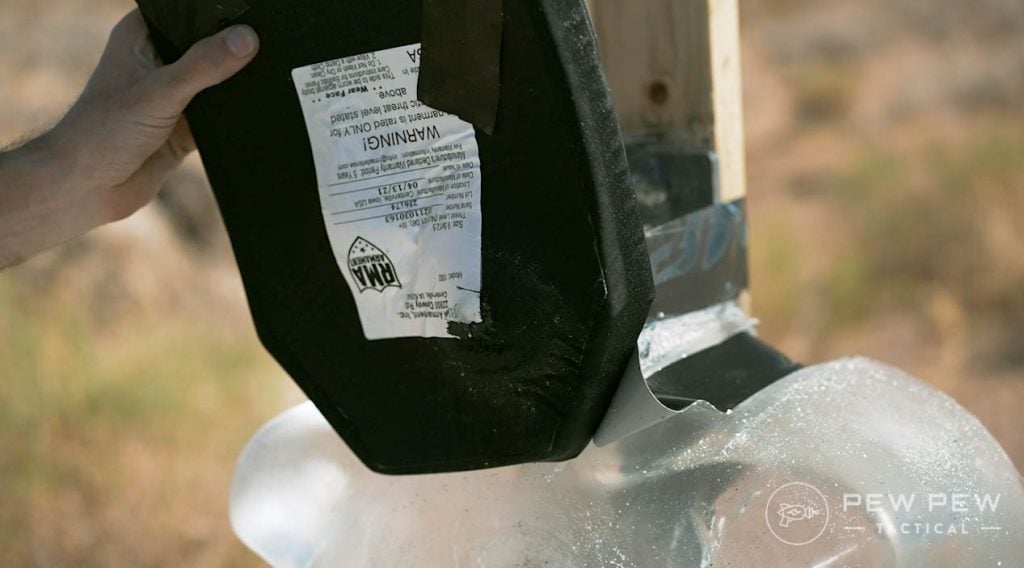
Interestingly, the RMA plate appeared to throw almost zero ceramic frag out the front of the plate on impact (compared to the LAPG Level III), even if its rear face deformation was slightly worse.
Wolf .223 did next to nothing, and M855 and XM193 were similarly eaten but with significantly larger rear bumps.
At last, we took The King out behind the shed to be put down with a Black Tip that’s rated for Level IV.
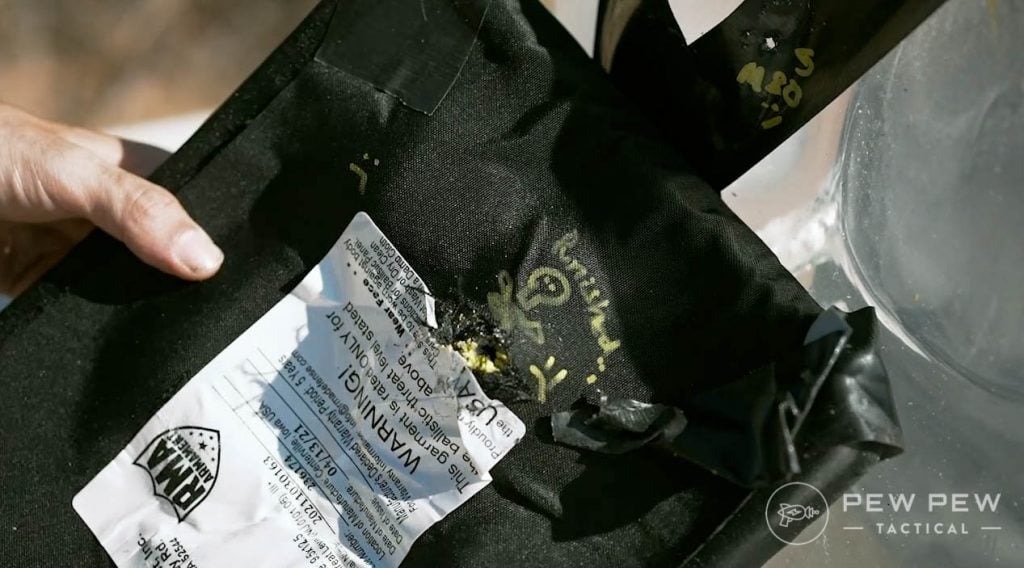
The mean and mighty round punched straight through the rear with a neat, fiber-laden hole.
RIP RMA, you were a good boy.
RMA was cool enough to give PPT readers a discount, so be sure to plug in PEWPEWTACTICAL5 on checkout.
Prices accurate at time of writing
Prices accurate at time of writing
-
25% off all OAKLEY products - OAKLEY25
Copied! Visit Merchant
AR500 UHMWPE Level III
Lastly, as far as the Level III plates go, we tested the AR500 UHMWPE plate. It comes in at 3.3-pounds and 1.3-inches thick.
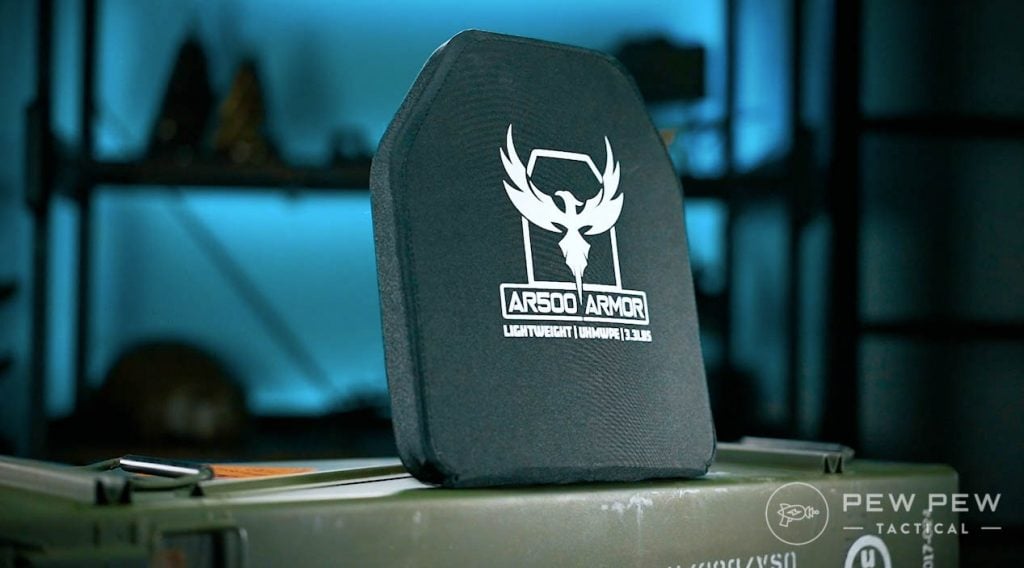
First shot with the Tula displayed a minimal amount of deformation on both the front and rear surfaces. But, all good otherwise.
M80 ball was handled without issue as well. Although, it did induce an odd horizontal perforation in the nylon on the plate’s rear face without actually penetrating it.
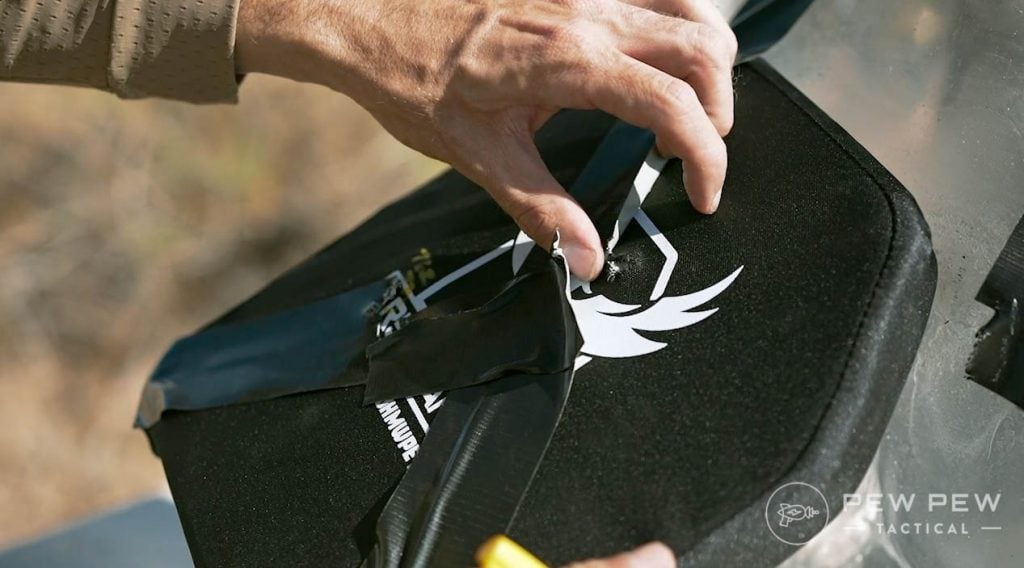
Interestingly enough, even though a pure polyethylene Level III plate isn’t technically rated for it, the AR500 UHMWPE plate handled Wolf .223, 193, and 855 with a large lump forming dead center of the plate – but all good penetration wise.
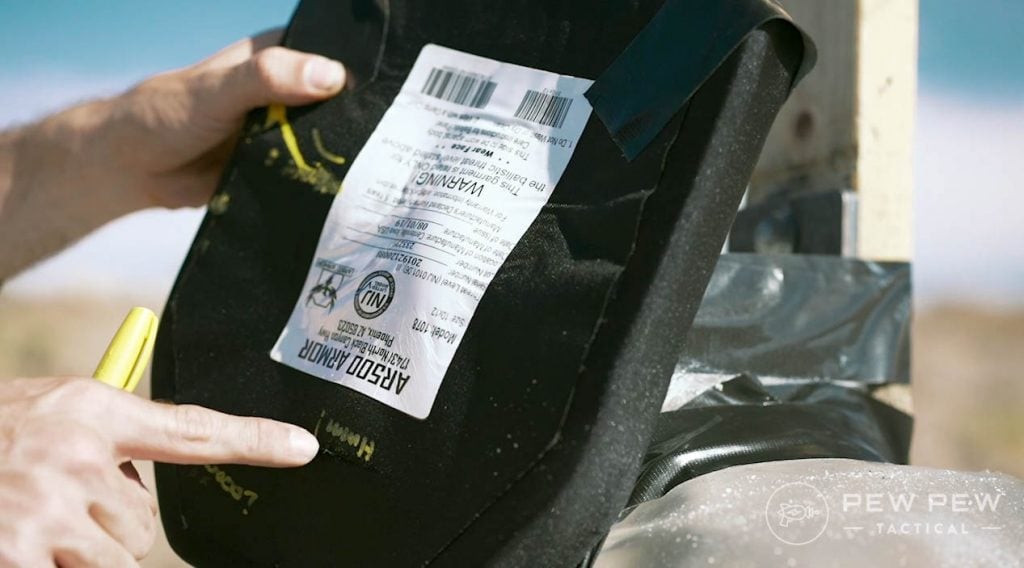
For its troubles, the plate earned a vaunted kill shot from the Black Tip.
It hit a little high center, swerved upwards through the plate, and exited the rear about 2-inches higher than it entered.
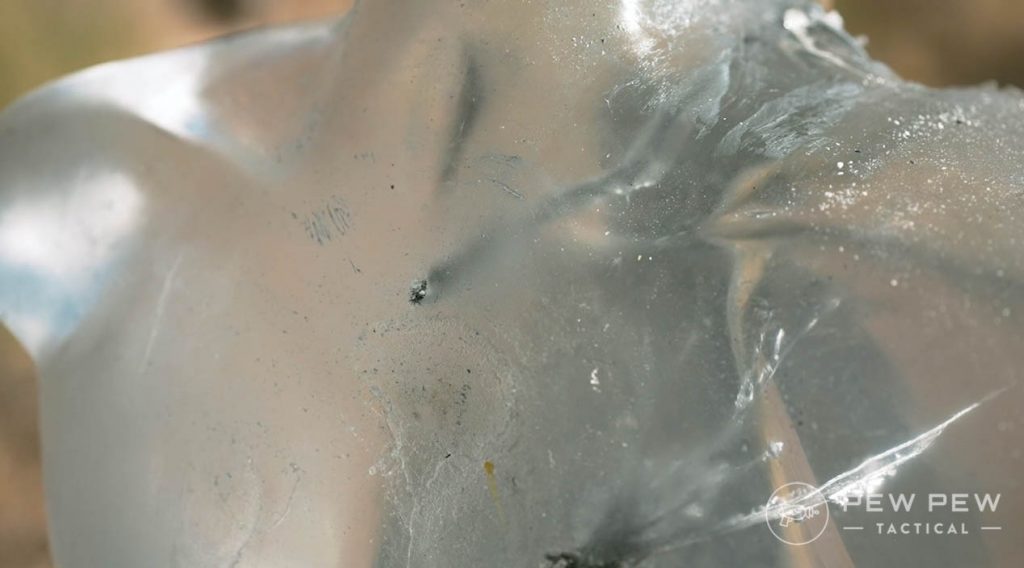
Finally, it climbed through the poor gel man’s trachea, exiting the rear of his neck to fly off somewhere into the desert.
I guess if it’s your time to get the card punch, this would likely be an instant light’s out. Probably the way to go, but….OOOF.
-
25% off all OAKLEY products - OAKLEY25
Copied! Visit Merchant
Level IV Ceramic & UHMWPE Armor Testing
Standing atop the fragmented ruins of our Level IIIs, we turn now to our Level IV plates.
We’ve tweaked our formula here explicitly to induce failure and gather what we may from the results.
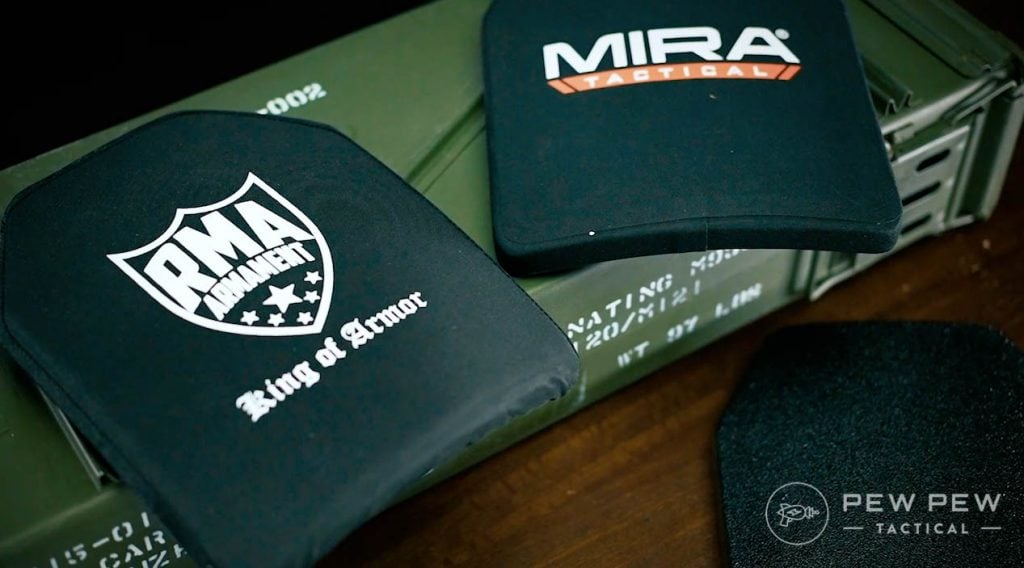
One of the bigger things we’ve been curious about is what exactly multi-hit means when it comes to body armor.
As mentioned above, the NIJ standards dictate that a multi-hit plate must be capable of withstanding six spaced hits from an M80 ball.
But if you’re unlucky enough to get shot at, what are the odds that any string of hits will be sufficiently spaced to allow the plate to withstand all of them?
It seems far more interesting to see what happens to Level IV armor when you explicitly tap them with a tighter group.
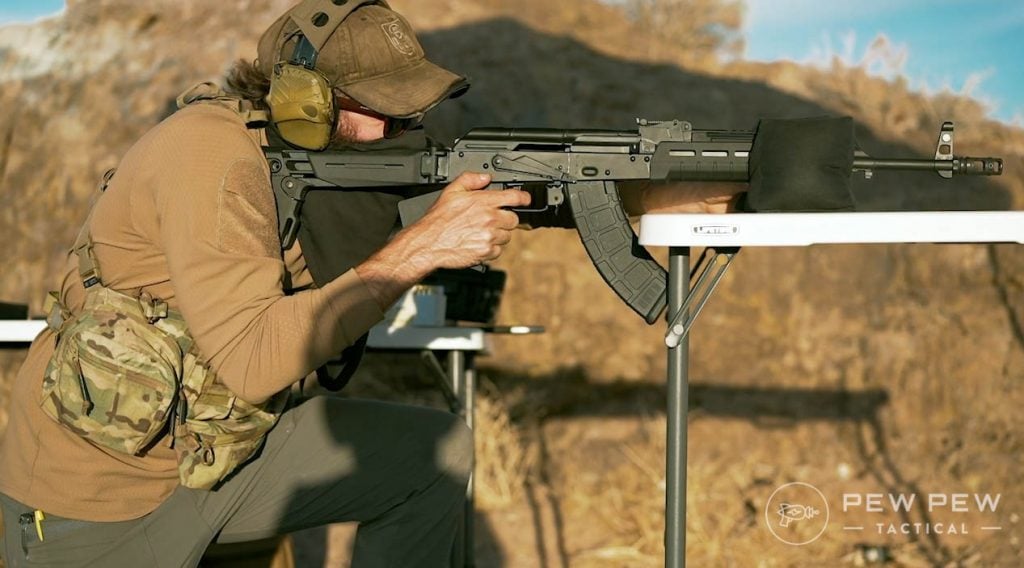
Our level 4 test was performed as follows:
The Tula 7.62×39 appetizer remains, but this time we chose to double-tap the plate with an M80 ball. Specifically, we aimed for the section of the plate damaged by the first shot when sending the second.
From there, we ditched the M855 and XM193. Instead, we subjected the plates to two groups of two hits from Wolf .223, 55-grain for a total of four hits in a reasonably small cluster.
Finally, we sent a Black Tip home for dessert.
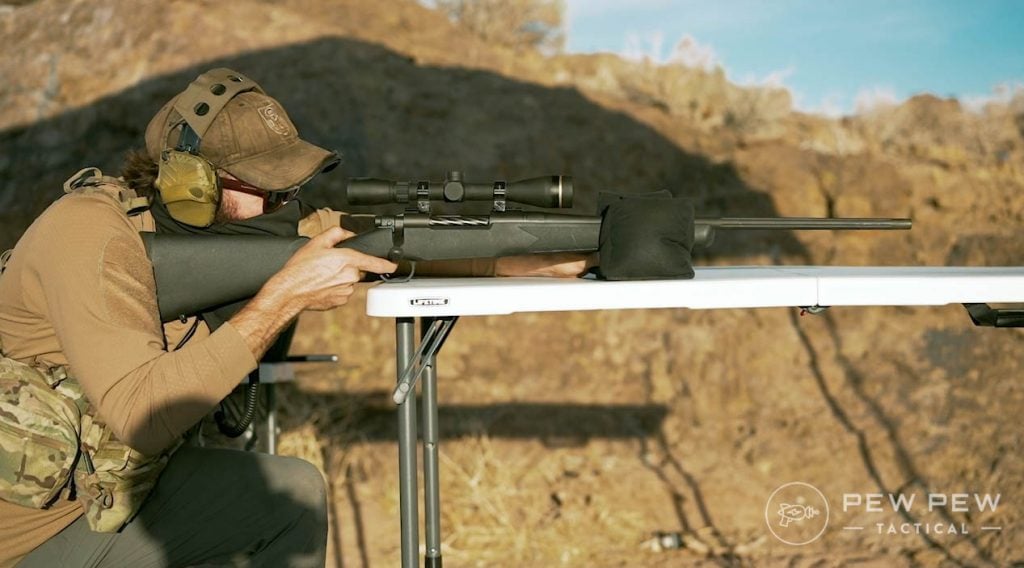
LAPG Level IV Plate
Up first, another LAPG plate, but this time, rated for Level IV threat protection against those pesky .30-06 Black Tips. (In theory…)
It’s a bit heftier at 6.5-pounds per plate with a thickness of 1.8-inches, but that’s to be expected with Level IV armor.
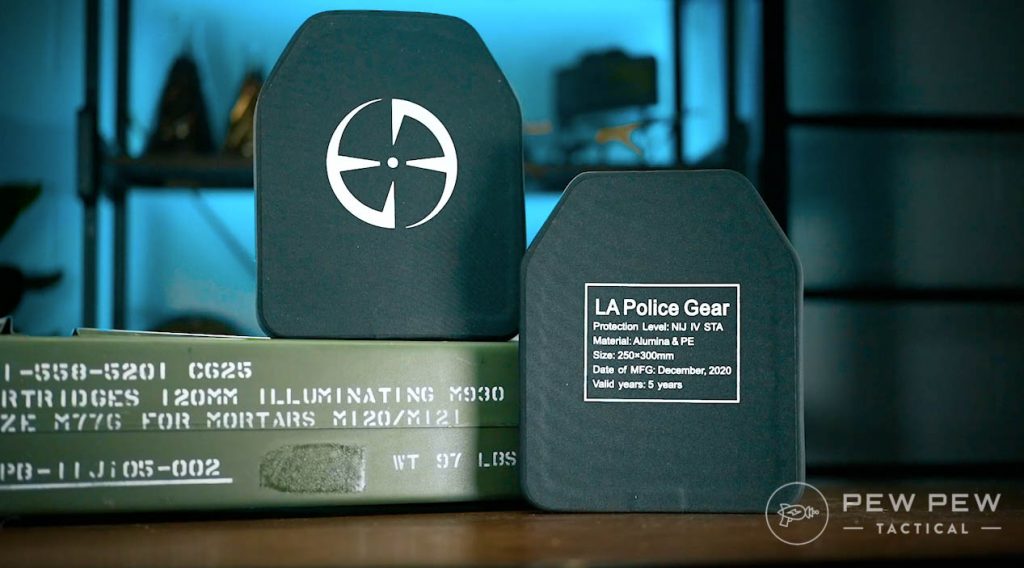
First shot with our Tula 7.62 was stopped in a similar manner as the Level III.
There wasn’t a ton of rear deformation, but a pretty significant cavity opened up on the front side of the plate in the area where the ceramic used to live.
Not…great, but totally survivable.
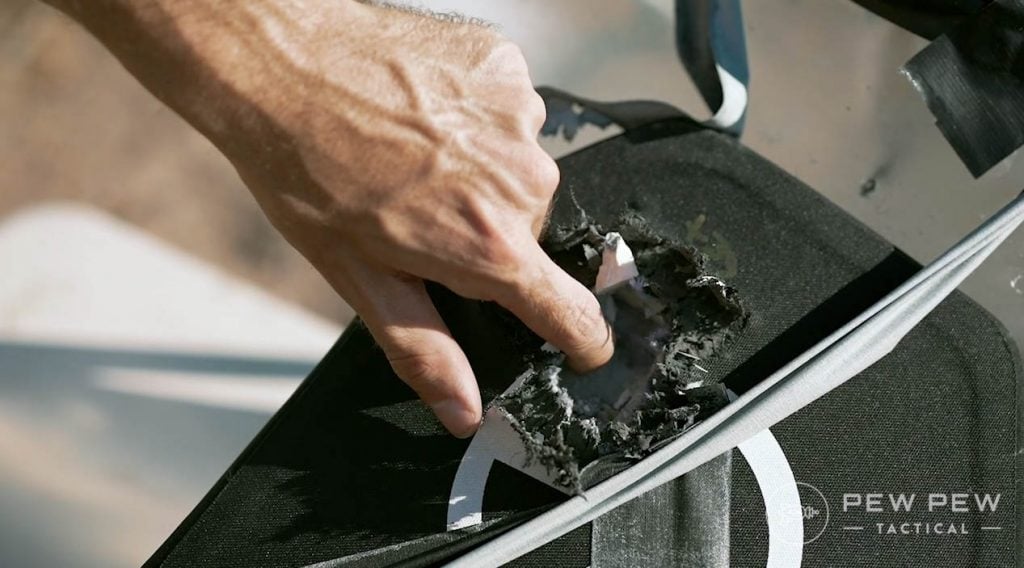
Our first shot of M80 in the upper right again caused some pretty significant cavitation, spewing ceramic chunks onto our table.
Here’s where it starts to get interesting…
The follow-up shot, aimed in that same general area, punched clean through the plate. It lodged a .308 projectile and jacket shrapnel in the lung area of our gelatin man.
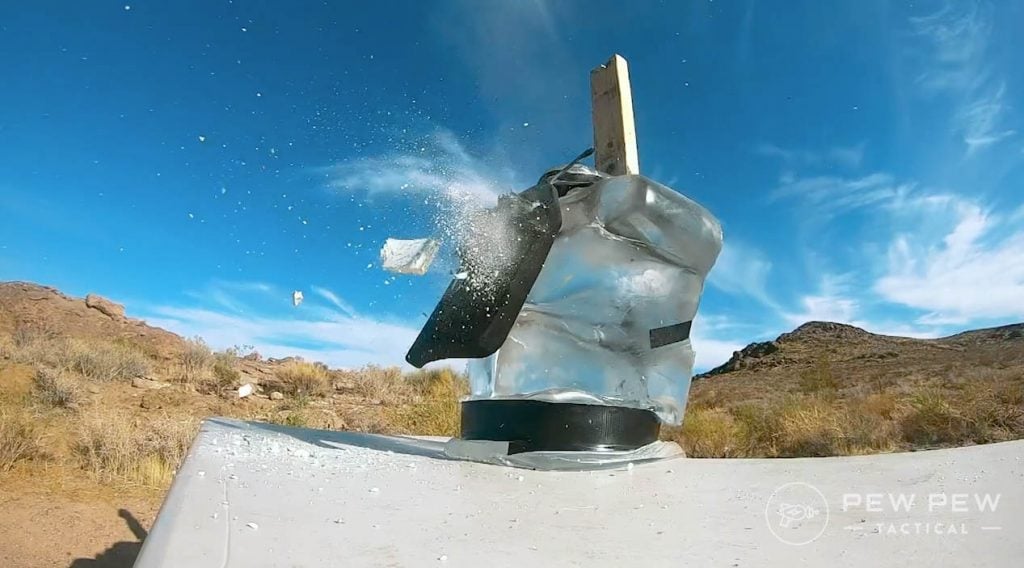
So, yeah, a plate on paper might be rated to take multiple rifle rounds and keep trucking.
However, the reality is that when the plate spews huge chunks of ceramic outwards, that leaves a cavity behind significantly larger than the round you fired at it.
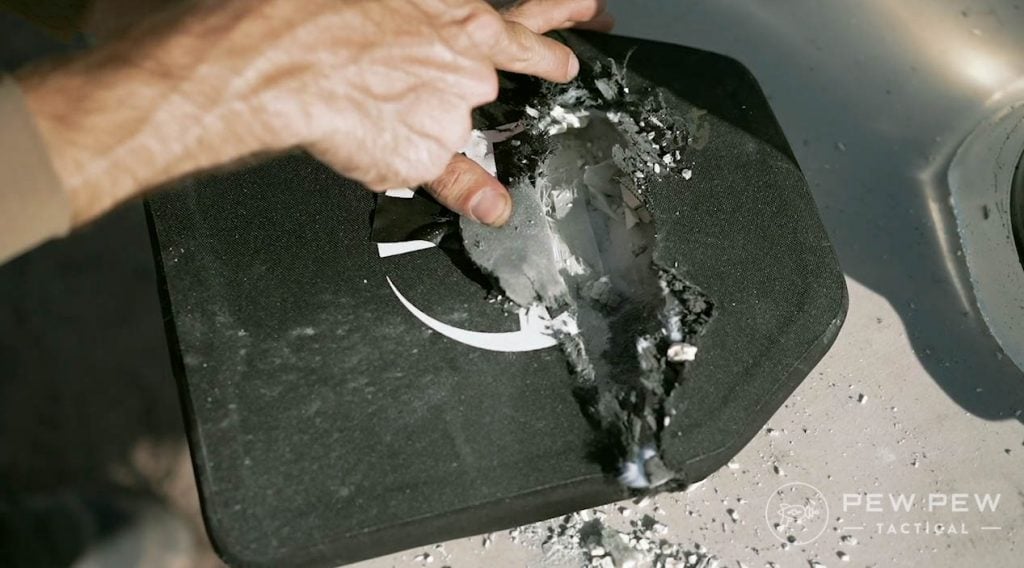
So, you’re left with continually decreasing ballistic real estate to absorb that follow-up shot.
In our case, that first M80 round knocked out so much ceramic strike face that the second couldn’t be slowed down or stopped by the polyethylene and alumina backer that remained.
Sure, the plate can probably take a total of six completely symmetrical M80s if you painstakingly make sure to land them just so. But again, how likely is that?

From there, we moved on to repeating multi-hits again with Wolf .223.
While the smaller projectiles took less material with them upon each hit, the first two rounds carved out enough of a cavity that the second two penetrated the plate with ease.
Lastly, we moved to an uncompromised section of the plate to see how the LAPG Level IV reacted to the .30-06 Black Tip. In theory, it should be able to catch.
Lo and behold, it…didn’t.
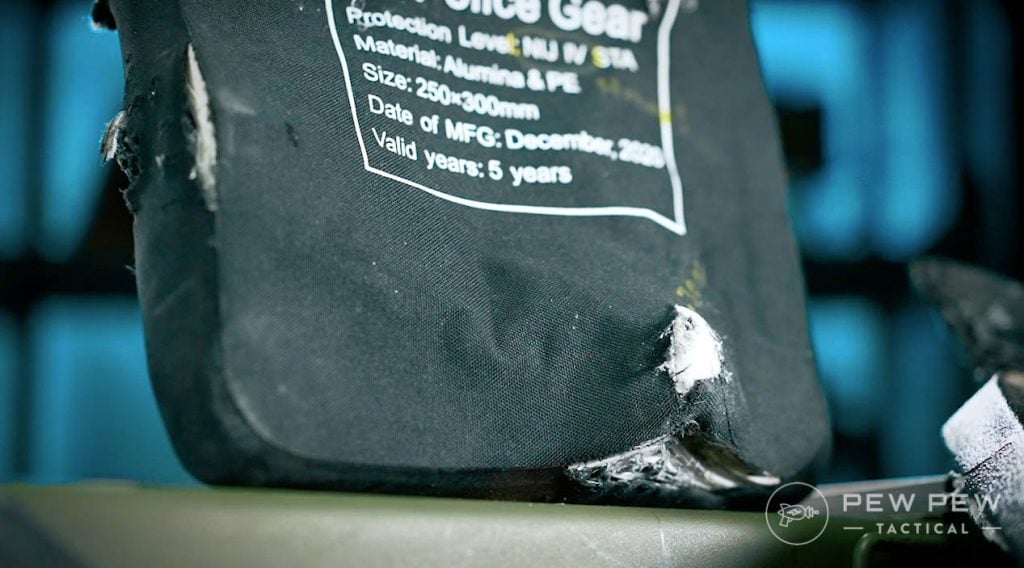
It appears as though the plate did its best against the almighty Black Tip.
While it did manage to catch a significant portion of the round, jacket fragments and the penetrator itself blew the lower seam of the nylon away from its edge material.
This allowed pieces of the round to escape downwards in the new weak spot the distension created.
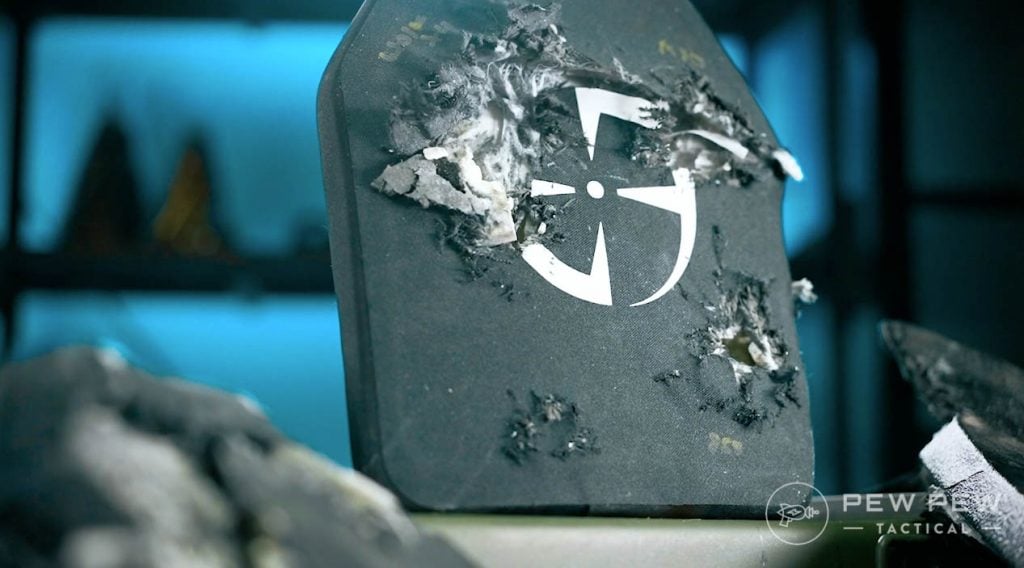
While this is, undoubtedly, a better alternative than taking the full round straight to the gooey bits, obviously, it’s still undesirable.
Honestly, it’s a bit surprising considering Level IV plates should be able to stop at least one .30-06 Black Tip.
But onward!
Prices accurate at time of writing
Prices accurate at time of writing
-
25% off all OAKLEY products - OAKLEY25
Copied! Visit Merchant
RTS Tactical Level IV
Next, we’ve got RTS Tactical’s Level IV coming in at 6.3-pounds with just over an inch in thickness.
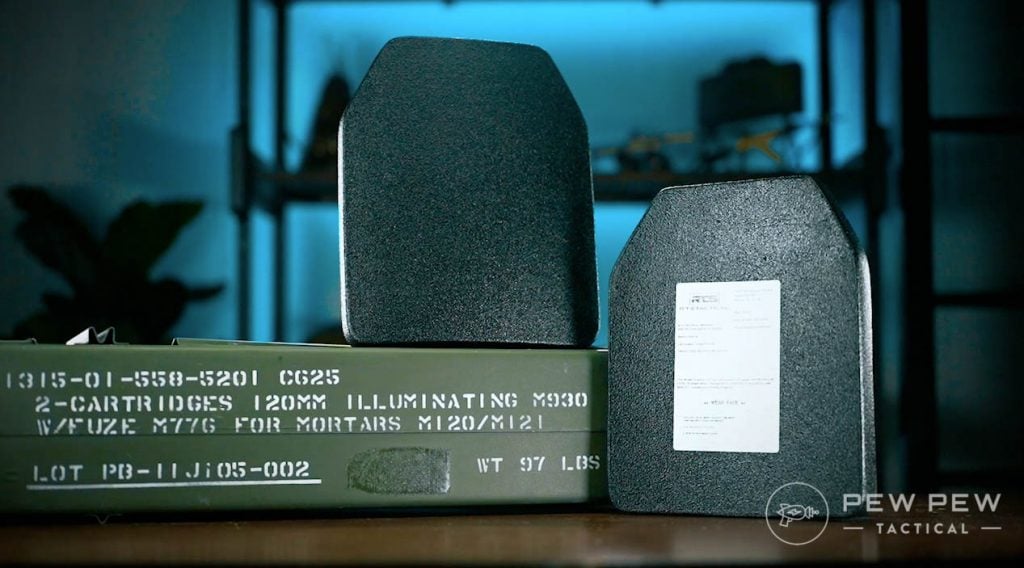
Our initial 7.62×39 shot landed dead center.
Compared to the plates wrapped in nylon material, the polyurea coating appears to significantly help with cavitation in the ceramic materials.
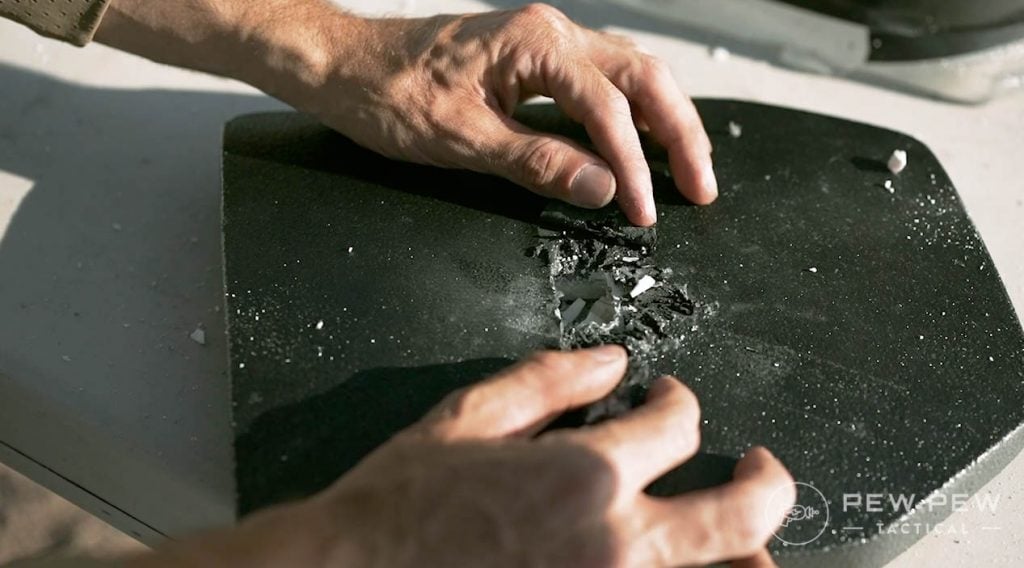
No particularly nasty rear face deformation, so on to the M80.
Once again, the first M80 that landed in the upper-left portion of the plate dealt such severe damage to the ceramic that the follow-up shot completely blew the upper-left edge of the plate out, penetrating with ease.
Goodnight, sweet gelatinous prince.
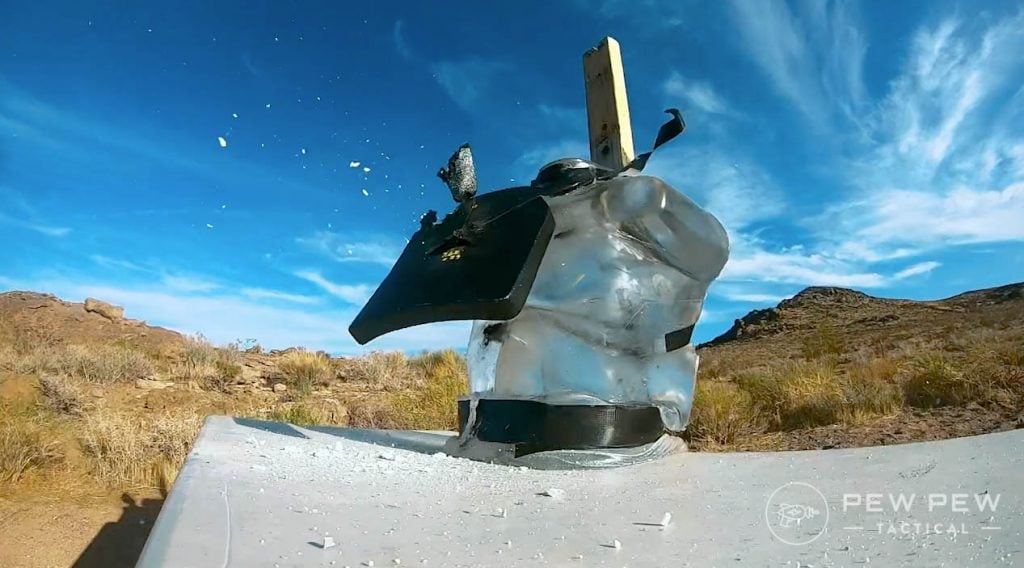
On to the four rounds of Wolf .223…and we’ve got some curious results.
While there didn’t appear to be an obvious exit hole from any of the four rounds, it does seem that the string of hits damaged the plate enough that they deflected out of the sidewall of the upper right corner of the plate.
This sent jacket fragments and spalling into what would be the sensitive under-armpit area of our boy if only he had limbs.
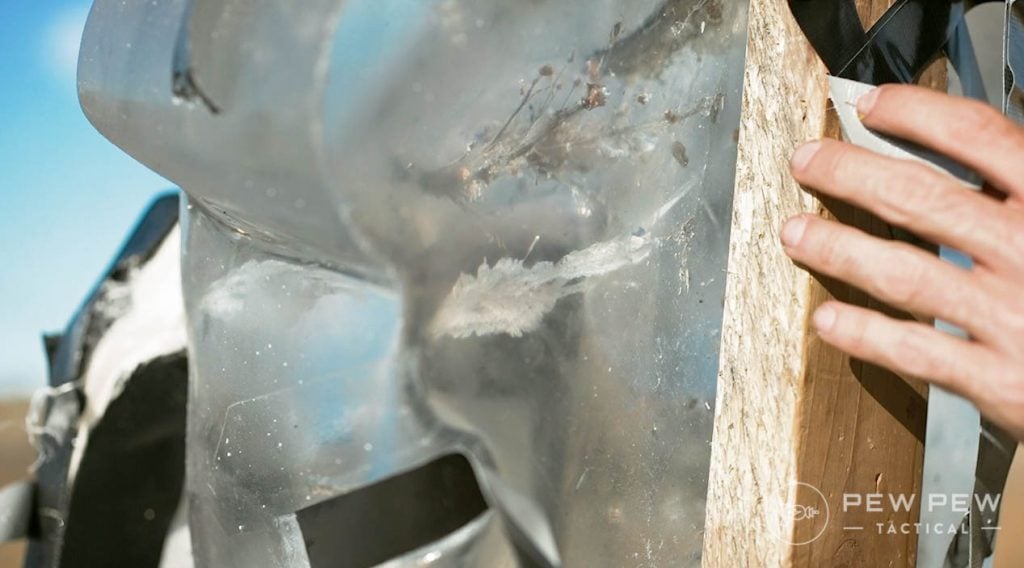
Impressive that the plate withstood two direct hammer pairs in the same area nonetheless — even if showering your limbs with burning pieces of metal is a terrible consolation prize.
It’s much better than the alternative.
Finally, that Black Tip comes knocking, and ohhhh boy, we saw a pretty catastrophic failure.
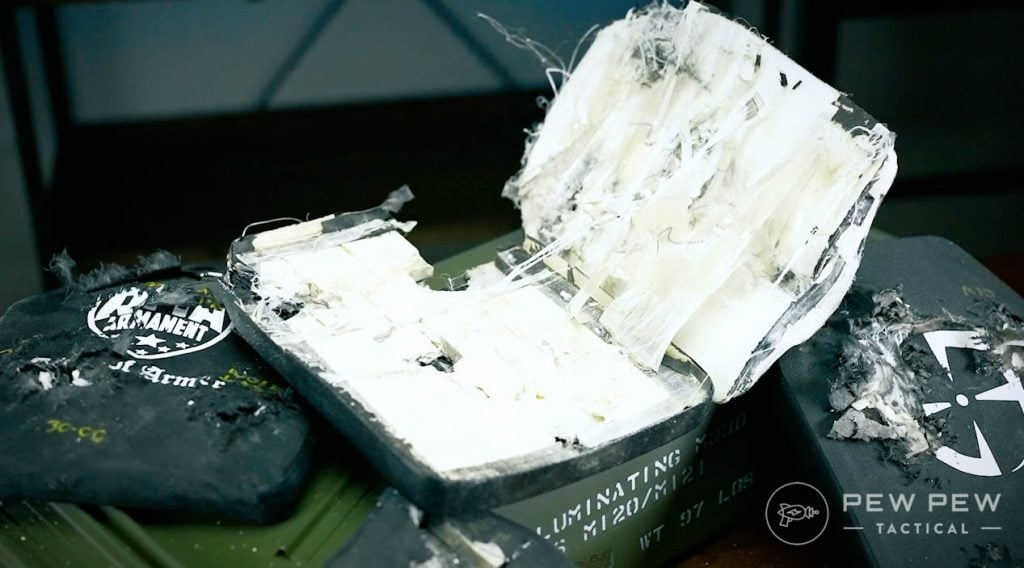
While the backing material slowed the round enough not to create any obvious rear face penetrations, the deformation length is pretty damn wild.
The round may have just blown the entire lower seam out, escaping directly into the ground or into our gelatin boy’s non-existent genitalia. Ouch!
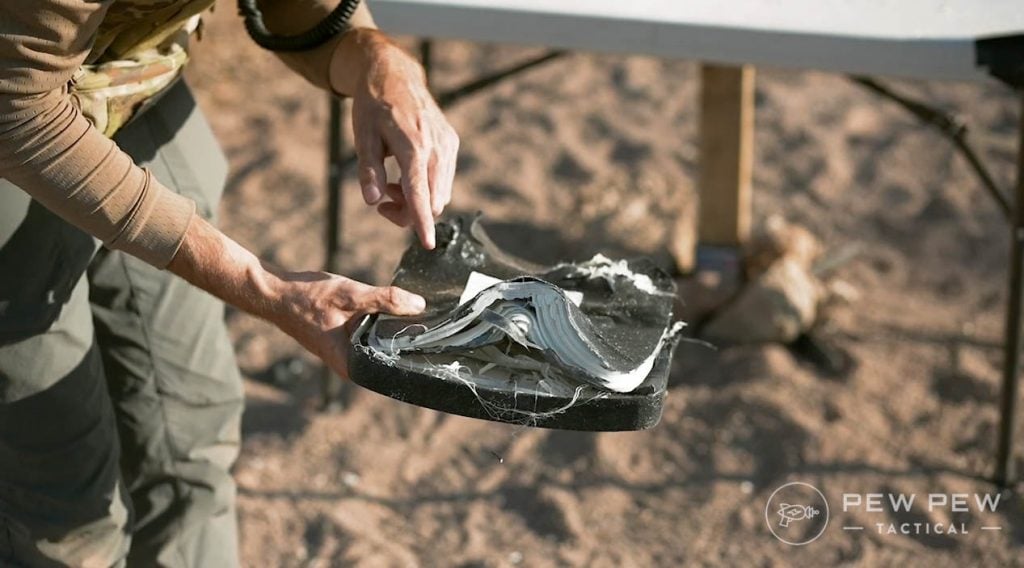
In addition, the sum total damage cut the plate right in two. We didn’t see this occur on any other Level IV we shot.
Prices accurate at time of writing
Prices accurate at time of writing
-
25% off all OAKLEY products - OAKLEY25
Copied! Visit Merchant
RMA Level IV Multi-Curve
Weighing in at a pretty monstrous 8-pounds per plate with 1-inch of thickness, the Multi-Curve plate is a combination of ceramic and presumably PE.
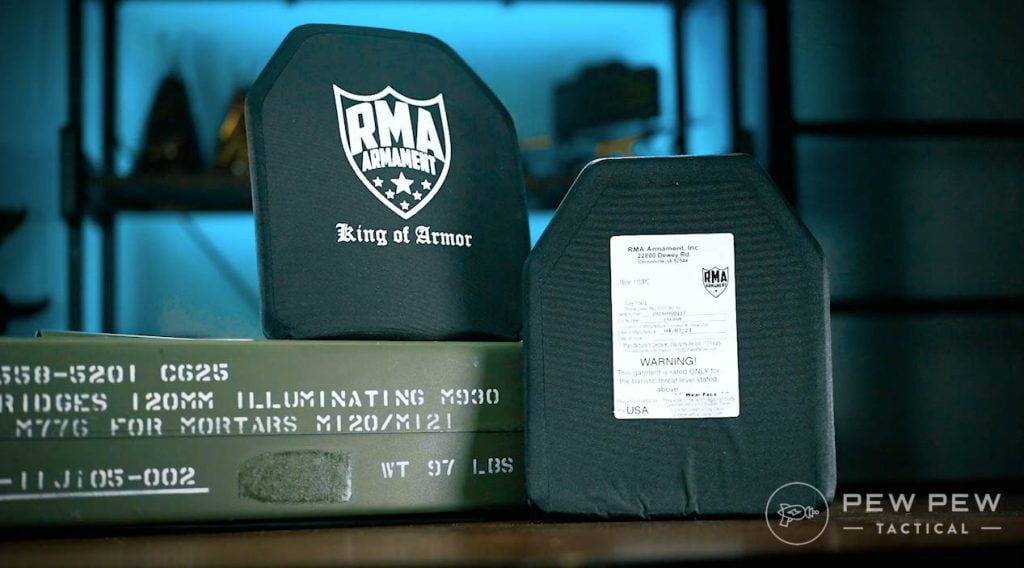
Our first Tula 7.62×39 took a good chunk of ceramic with it but didn’t manage to penetrate the ceramic all the way through. (This left the backing material exposed on every other plate.)
In addition, there’s literally no backface deformation at all. Perhaps that extra 2-pounds comes into play.
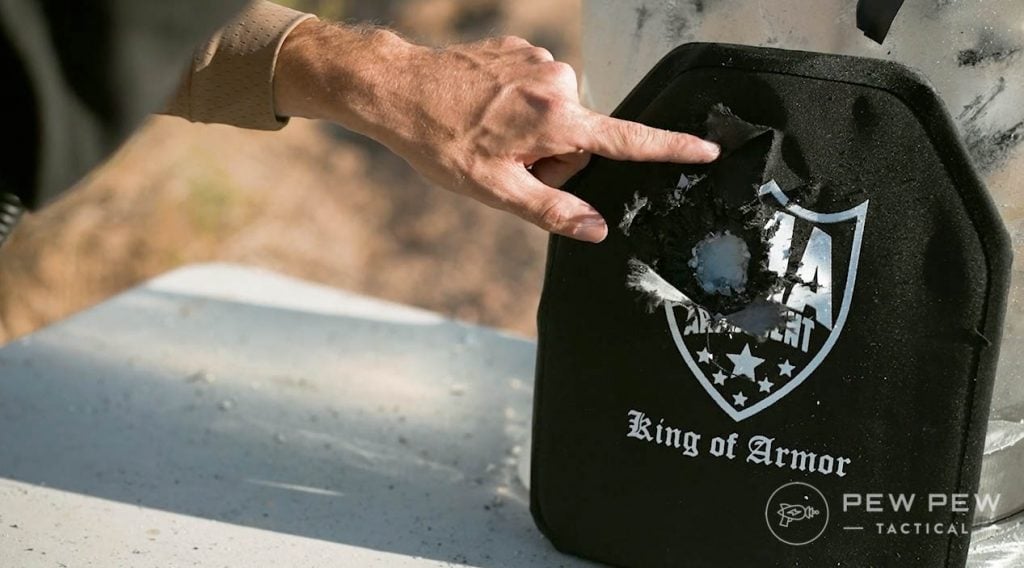
The RMA plate also seems to throw significantly smaller chunks of ceramic than others, leaving a smaller overall area compromised after the first hit.
Still, it appears it sustained just enough damage to be compromised by that second hit of M80, which punched clean through despite being a good inch or two away from the first impact.
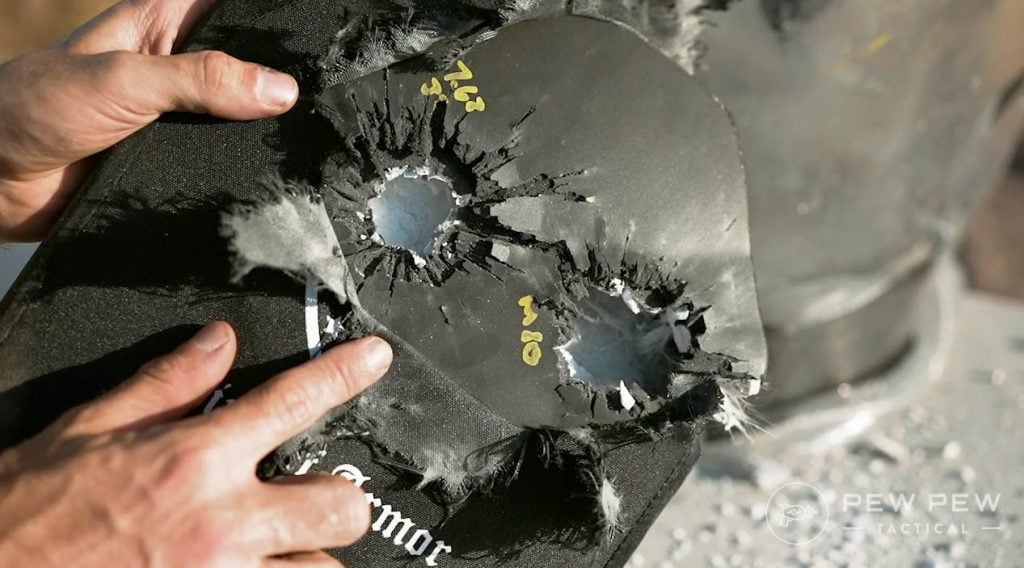
Are you starting to see a pattern?
Similarly, the Wolf .223 gradually ate its way through, with penetration finally occurring on the fourth round.
Remarkably, the footprint these rounds carved out in the plate appeared way smaller than on any of the others.
Even though it failed in the end, we admittedly drilled pretty close to the same bit of real estate repeatedly.
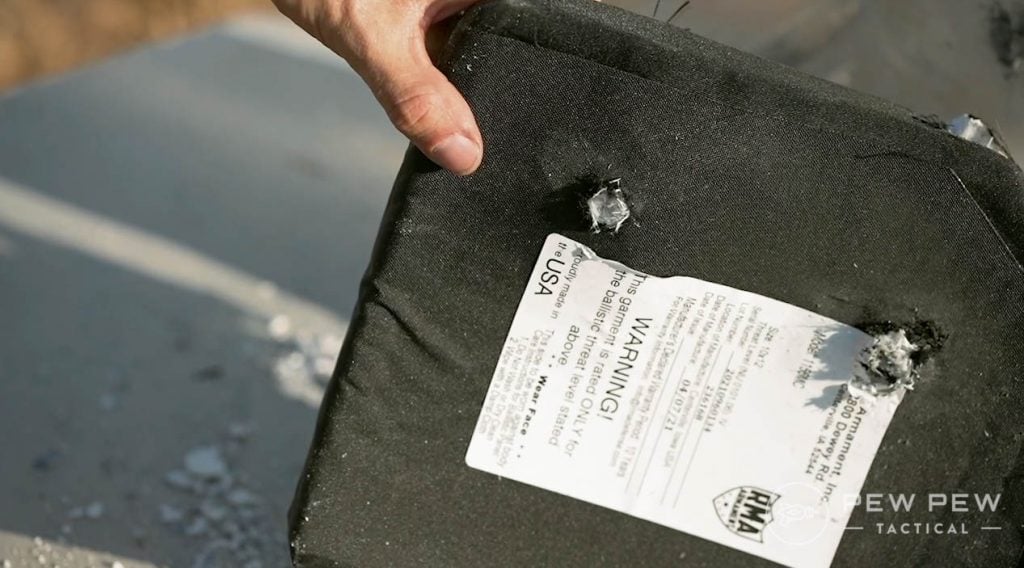
Had those shots been as spread out as our other string of Wolf hits, the results would likely have been different.
And finally, we moved to .30-06….And not only did the RMA Level IV swallow it whole, but the rear deformation of the plate is practically zero.
While the LAPG and RT plates….kind of stopped the Black Tip, this is our first, conclusive dead-in-its-tracks stop.
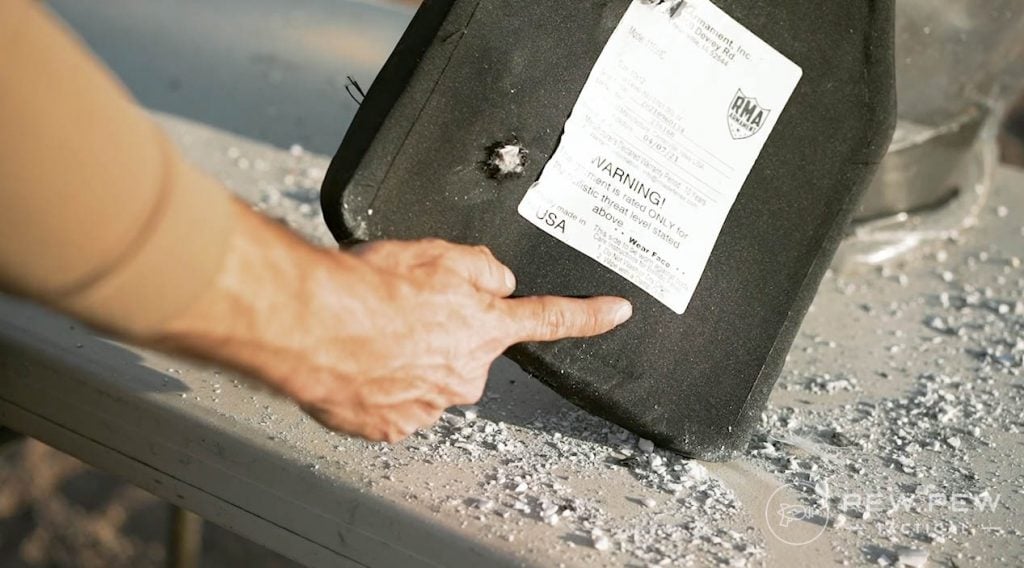
The RMA managed to do so without dealing the equivalent blunt force damage of a sledgehammer to your torso in the process.
Color us impressed, RMA.
With that first Black Tip caught, you know we had to see what a second would do…
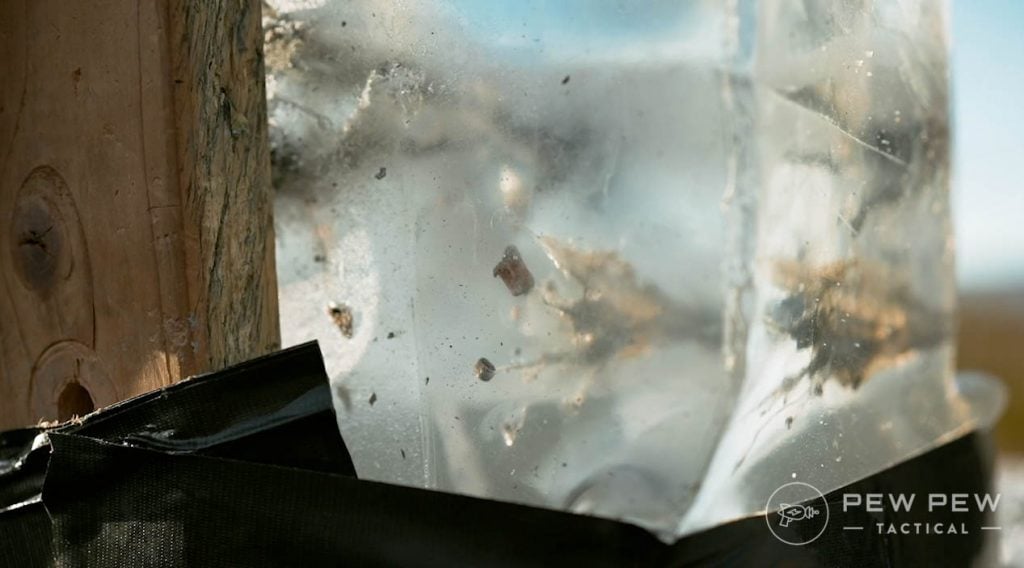
Sadly, it proved a bit too much for our hefty friend here.
Whether this was just bad luck in landing a hit on an already compromised area or not, we’re not sure. But, it punched clean through all the same.
Again, PPT readers get a discount at RMA, so be sure to plug in PEWPEWTACTICAL5 on checkout.
Prices accurate at time of writing
Prices accurate at time of writing
-
25% off all OAKLEY products - OAKLEY25
Copied! Visit Merchant
Mira Tactical Level IV Plate
Weighing in at just under 6-pounds and only 0.9-inches thick, the Mira Tactical Level IV is the lightest and thinnest Level IV in the lineup. Again, it sports a combination of ceramic and UHMWPE.
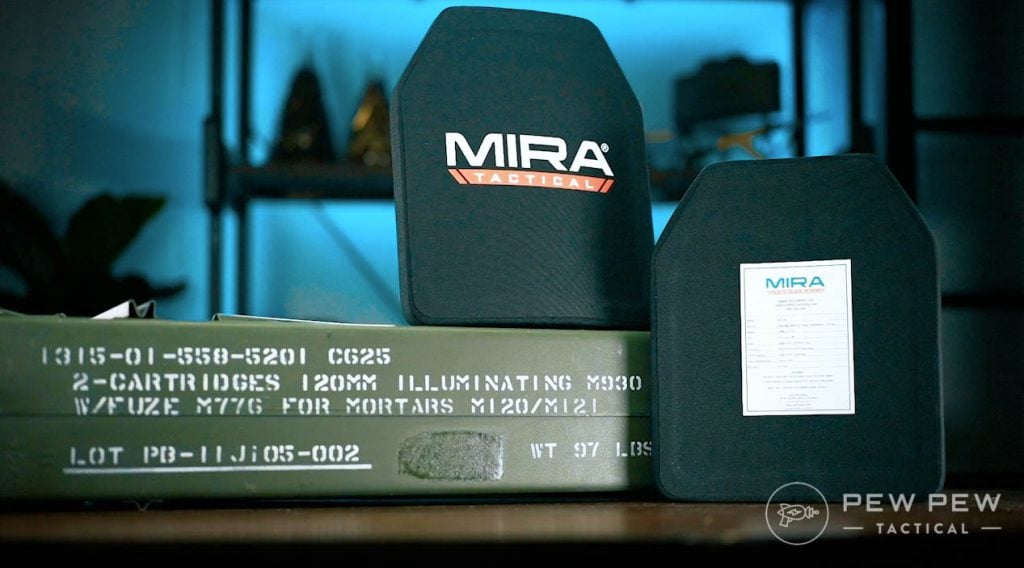
If Mira Safety sounds familiar it’s because they made some seriously nice gas masks to protect you from even nuclear events.
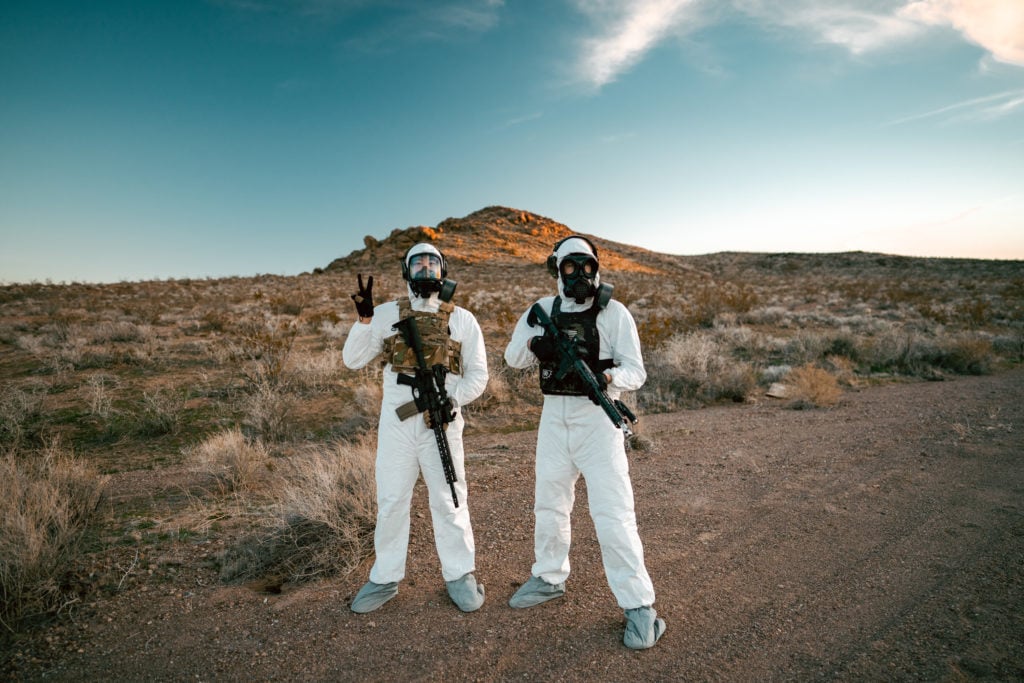
But enough about that...back to armor!
This Level IV saw no issues with the Tula at all, but a good amount of chunks were blown out the front.
Par for the course at this point, and with minimal but still noticeable deformation in the back.
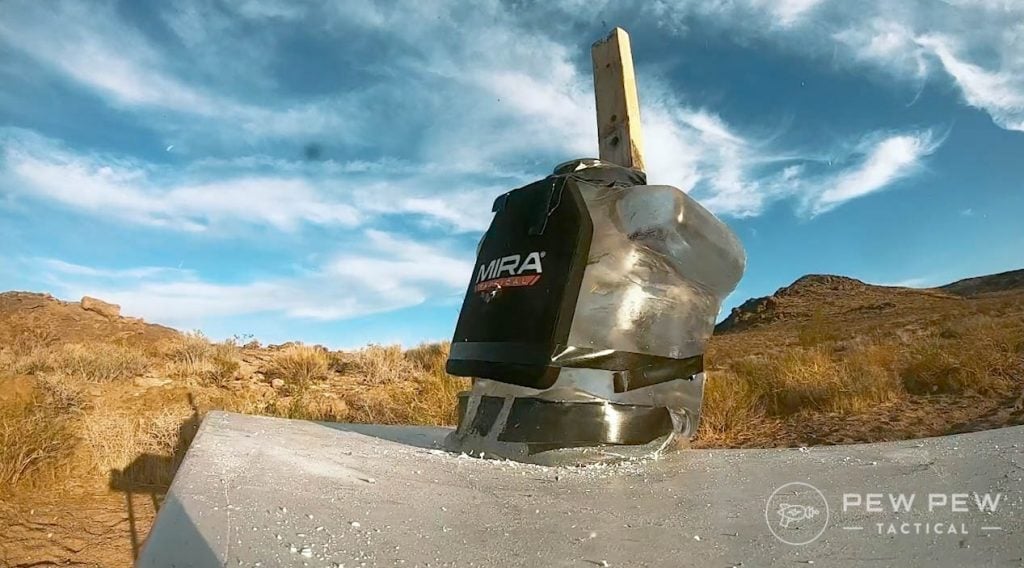
Although that first M80 hit took a good chunk of ceramic with it, the follow-up shot left no obvious rear exit hole.
Although there was a pretty nasty distension in its wake.
While we can’t say for certain, it almost looks as if the second round was deflected by the remaining backing material.
This forced the round upwards, and it blew out a corner of the top seam of the plate before shooting off to…somewhere in the vicinity of what would be your face and/or head.
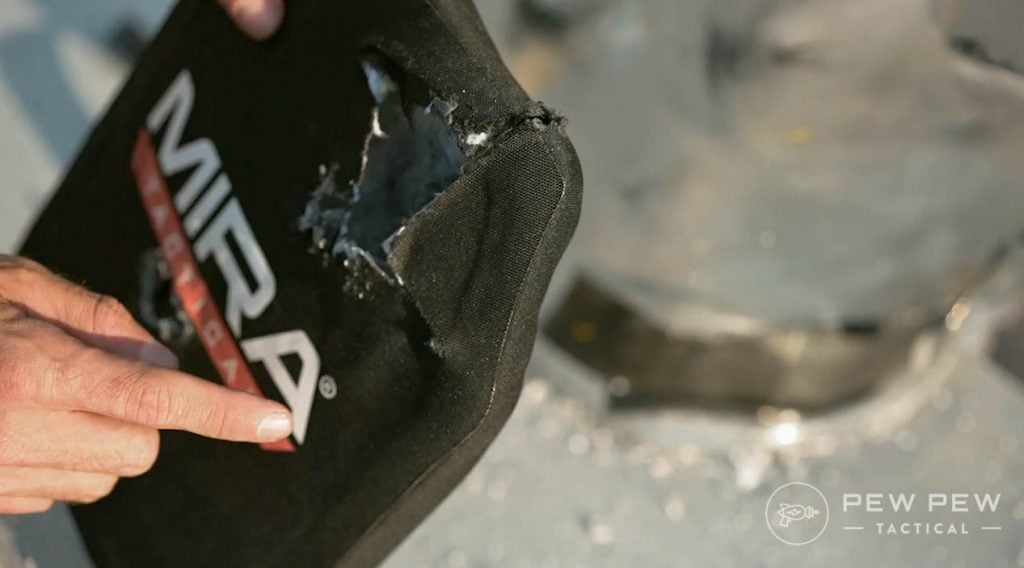
It’s the first time we’ve seen a plate deflect two consecutive M80s, which is commendable in our book – even if the second shot deflected in a way that wound up lobotomizing you.
However, the string of Wolf hits proved too much for our plucky Mira Plate.
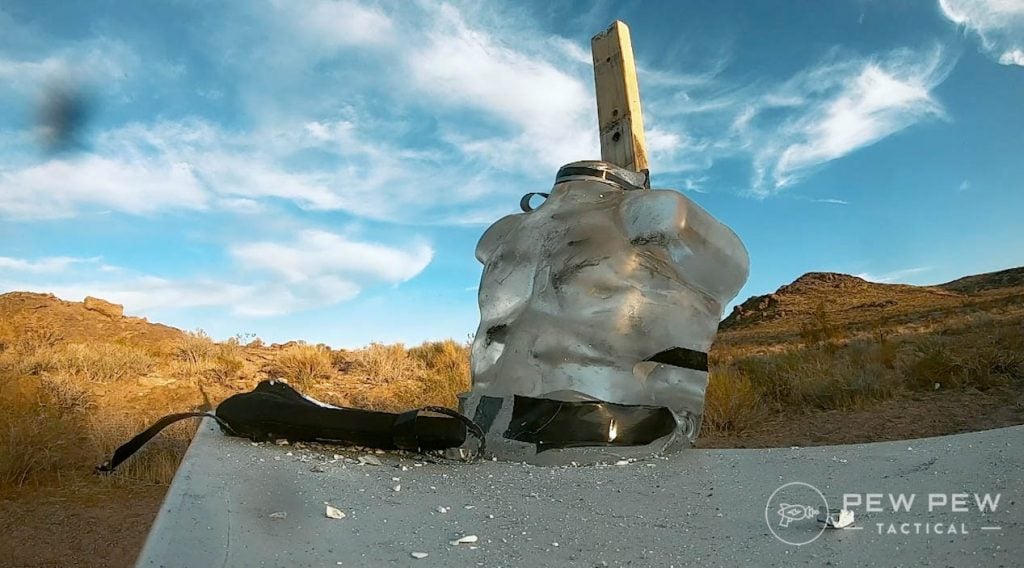
The fourth round penetrated the backing material after the previous three substantially compromised it. Not too shabby though.
But what about the Black Tip?
With only one plate catching an armor-piercing .30-06 without deleting itself, the bar is set…
Black Tip number one was caught and defeated, which meant it was time for a second.
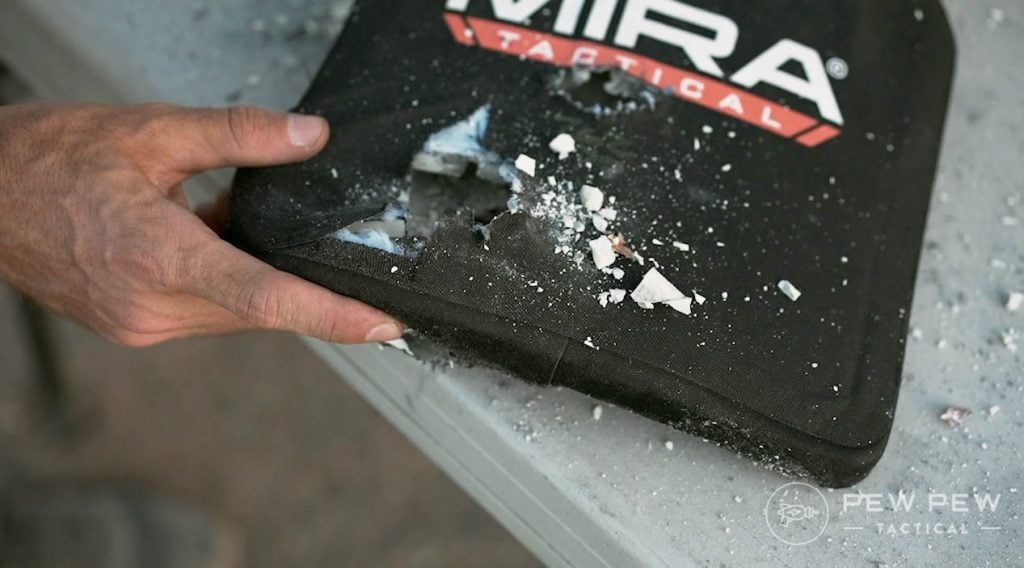
Surprisingly, the Mira Plate ate a second Black Tip with no issue outside of an even larger rear deformation.
Legitimately impressive!
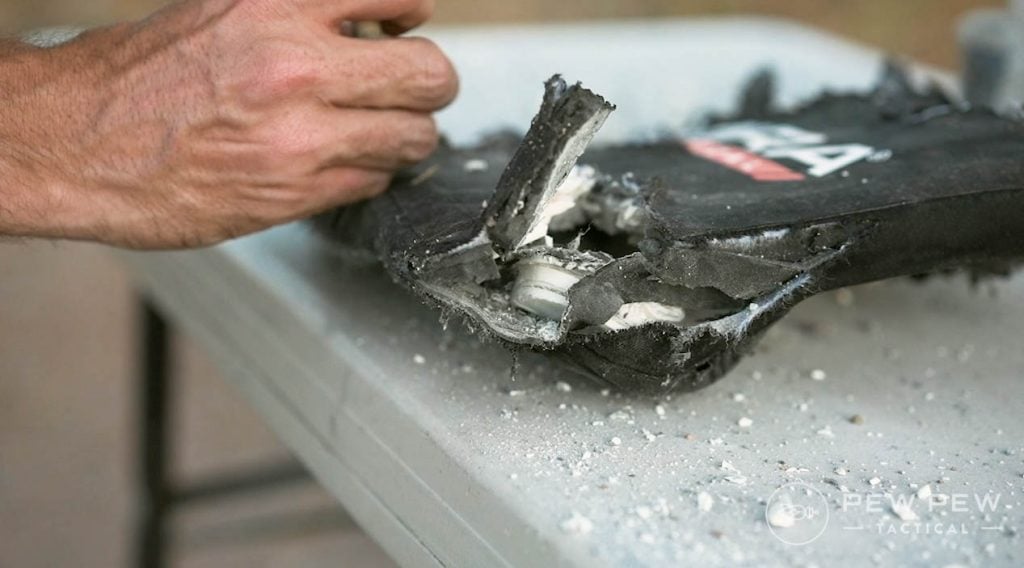
Even though you’re going to suffer quite the stomach ache from these borderline tennis-ball-sized lumps in the plate…you’re gonna live.
With that, our reverse science body armor murder fest winds to a close.
PPT readers enjoy a 15% discount (armor only) at Mira with code PEWPEW15.
Prices accurate at time of writing
Prices accurate at time of writing
-
25% off all OAKLEY products - OAKLEY25
Copied! Visit Merchant
The Results Are In…
So what are the takeaways?
Again, the big thing for us was showing exactly what enough bad luck (a.k.a. catching two rounds in close proximity) looks like outside of the sterile lab environments where this stuff undergoes testing.
To us, it’s critical to be realistic about what kind of abuse PPE actually stands up to, lest anyone fall prey to slick marketing.
There’s no Super Survival Mode that unlocks when donning a set of Level IV plates.
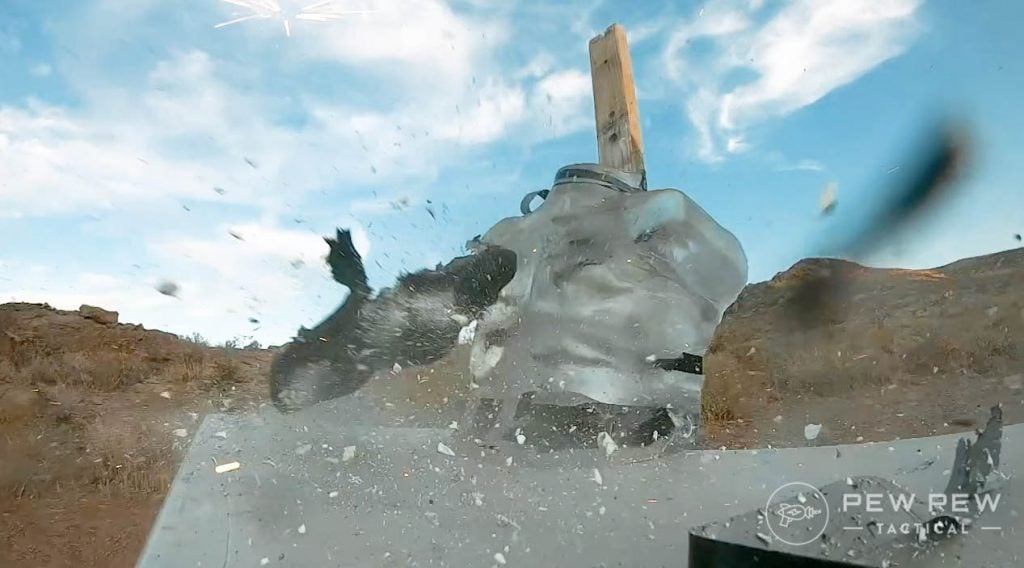
That said, it’s still up to you to decide what level of protection you do or don’t need.
I also think it’s telling that some of the less expensive armor plates blew out all or most of their ceramic strike face on the first hit, leaving you primed to take a blowout shot on a follow-up.
The difference in quality between manufacturers becomes a game of limiting the ceramic strike face lost from an initial impact while also mitigating the amount of blunt force trauma your body is subjected to.
RMA proved, hands-down, the winner when it came to a lack of rear face deformation — even from an armor-piercing .30-06 round.
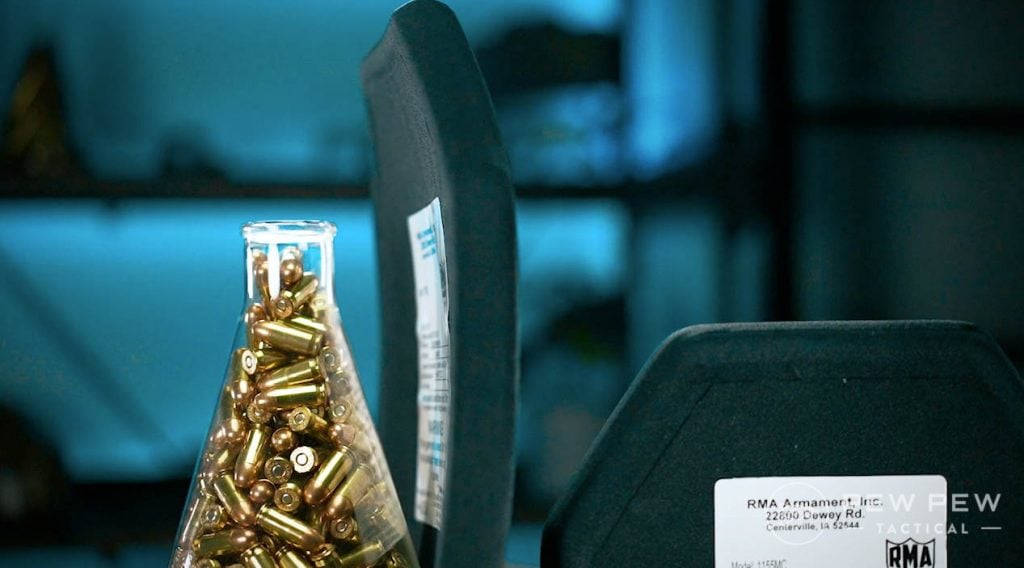
But, it obviously comes at the cost of being a heavier and slightly thicker plate compared to the competition.
The Mira Tactical Level IV Plate was the only plate to survive two Black Tips, arguably two successive M80s, and almost shrug the string of Wolf .223 hits – all while offering the lightest and thinnest Level IV plate (that we had on hand).
I think we can pretty firmly say the Mira Tactical and RMA Level IV come out as the clear winners for the money.
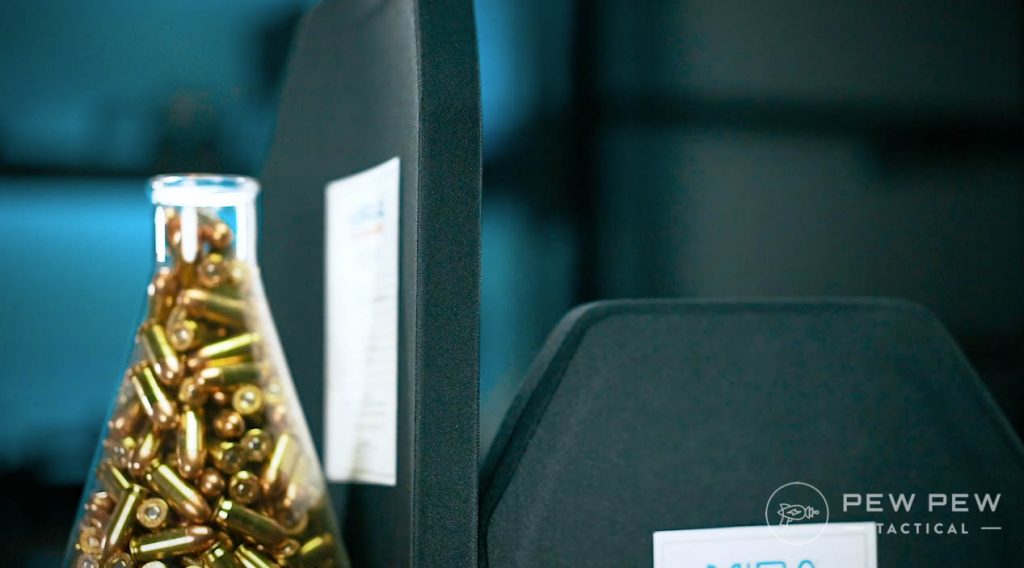
Conclusion
While this unscientific test was more for fun factor than anything, it did yield interesting results.
Namely, that marketing can create a false sense of security.
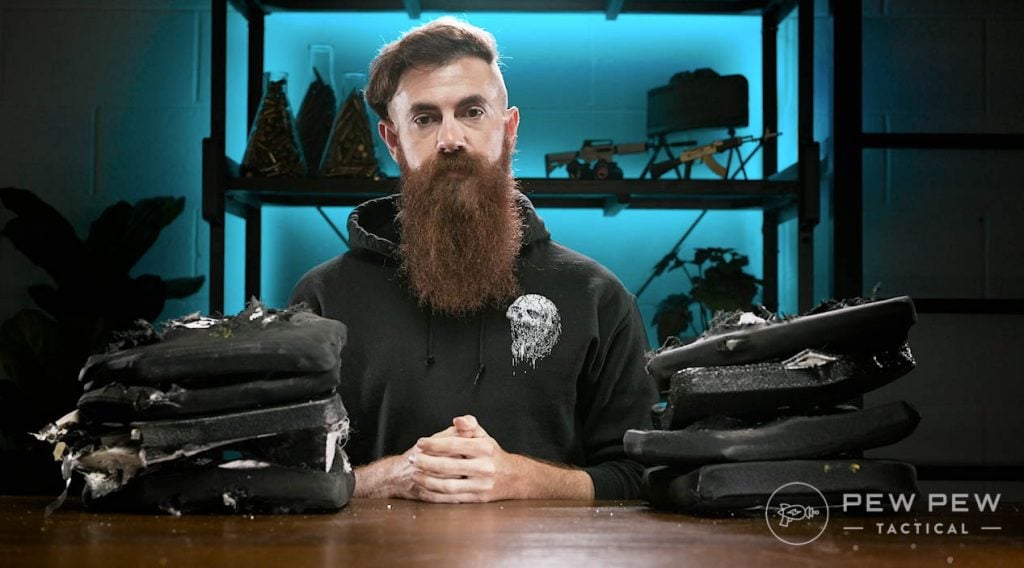
But, as always, you gotta figure out where you are personally in terms of cost, threat protection, weight, and so forth.
For our money, we think the Mira Tactical with code PEWPEW15 and RMA Level IV with code PEWPEWTACTICAL5 are solid buys, though.
If you have a little more coin to spend and want something thinner and lighter…go with the Mira. Something more cost effective but therefore thicker/heavier…go with the RMA.
To see these in action, make sure to watch the video below.
What do you think of this torture test? Let us know in the comments below. Now that you got plates, you need plate carriers. Check out our article on How to Set Up the Best Battle Belt & Plate Carrier. Or want to check out other armor options such as AR500…check out our master Best Body Armor article.










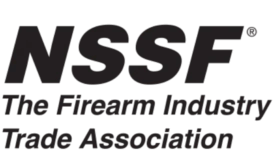








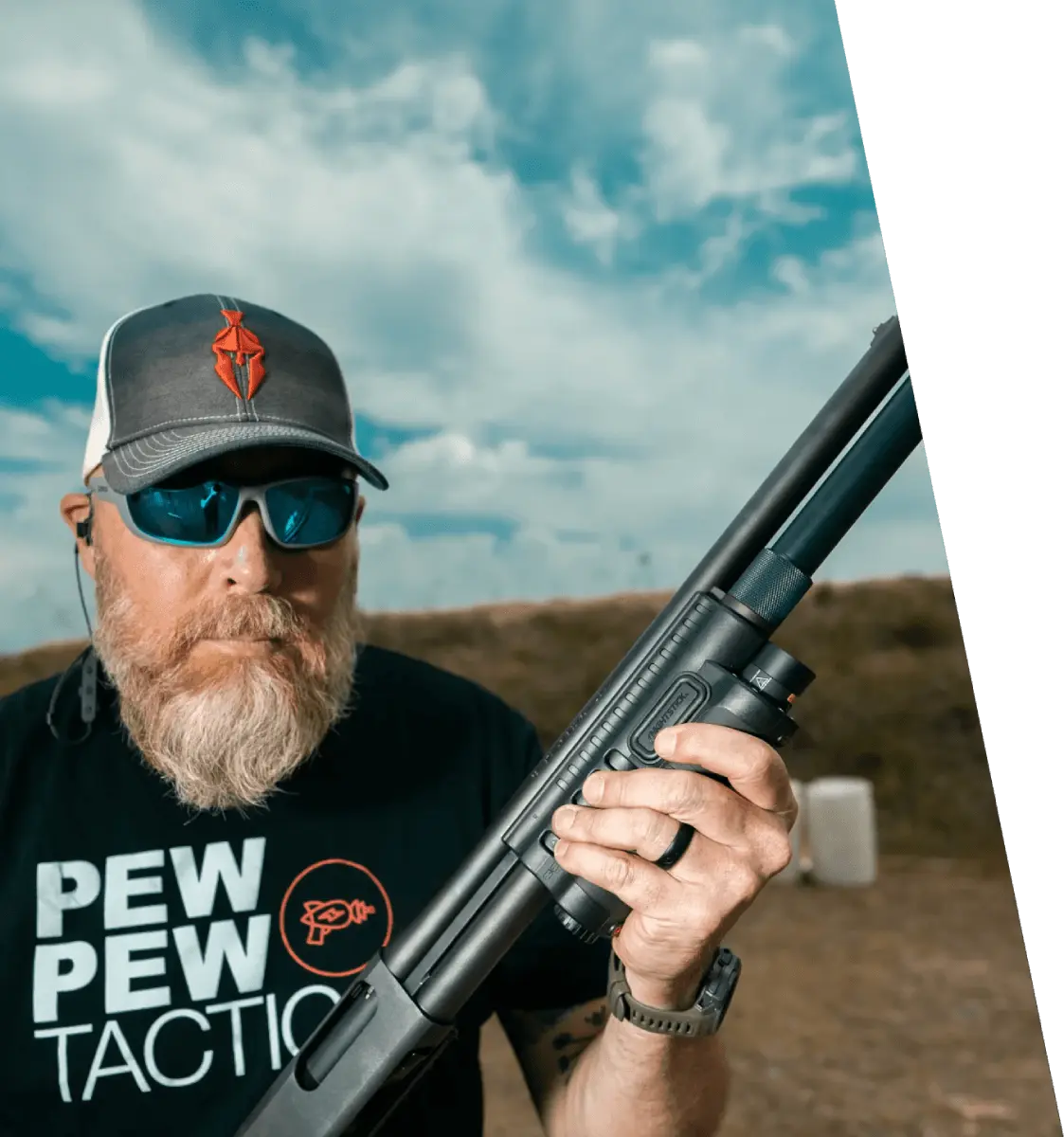

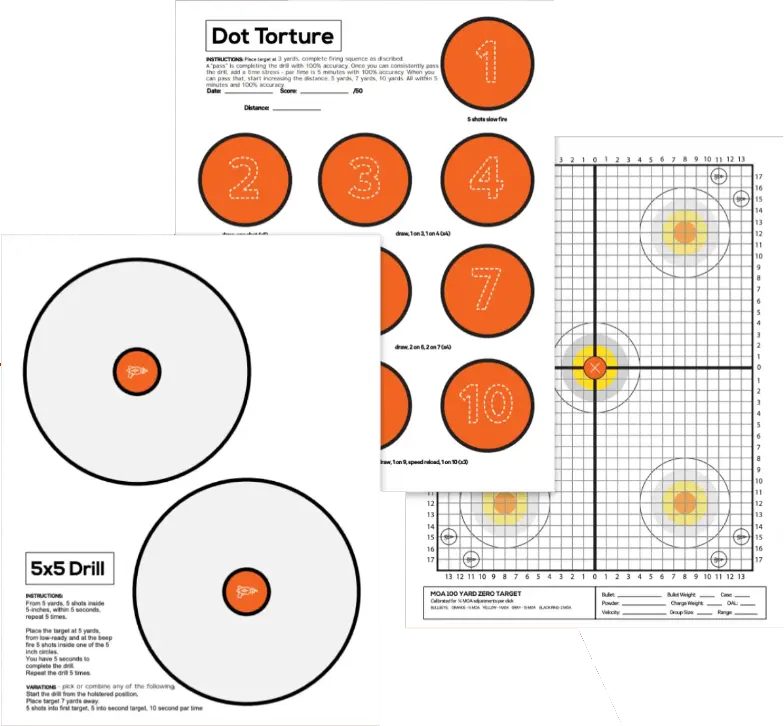
15 Leave a Reply
The BIG problem with the Mira plate is that it is not edge to edge. The ceramic only starts 1" from each edge along all four sides. This reduces the truw plate size by 2" full inches in width and hieght. No wonder it is lighter ! I would love to see Mira make a full 10x12 plate !!
With all due respect, you seem to have confused UHMWPE with PE fiber (e.g., what is found in the LAPG plate. That is not UHMWPE - it's just layers of unidirectional polyethylene sheets stacked up and heated to form a panel.
Is Safelife still relevant with their FRAS and Level 4s? Curious how they compare...
Coupon Code for RMA doesn't work
Thanks! We'll look into it!
Any update for RMA code?
Coupon code should work now for that product!
I think your test has a major flaw. You shot the same plate will all types of ammo. I believe a real test (Probably expensive though) would be to shoot fresh plates with each round. Fun article to read though.
Funny how there are discounts for the two plates they recommend...
How about shot stop? Anyone tried their stuff?
I used to run a NiJ level testing range in South Africa and your results don't surprise me.
I'd like to point out plates should be used in conjunction with a kevlar vest which would alter your results. In a lab test we mount the test subject on a block of plasticine to simulate being worn, the system is designed to be attached firmly to your body...so that also would alter the result. Any impact on the edge of a system can be problematic! Personally for everyday use I'd prefer an undercover vest because here in South Africa they tend to shoot you in the head if they know you are wearing a vest and steel core 7.62x39 ammo is going to solve all your worldly problems!
another vote for hesco l210
Duritium plates? Ace Link Armor?
Agree with below. You should have included HESCO plates L210 and their 3800’s.
Have you guys tried Hesco plates like the L210s or Hoplite Plate ? They seem to be also popular, although some of their plate pricing is definitely not budget (but is armor really something to go too cheap on?)